- Home
- Carolyn Keene
The Mysterious Image Page 8
The Mysterious Image Read online
Page 8
“Oh yes, of course. They’re both examples of what we psychologists call subliminal perception.”
The professor explained that the usual way of performing such an experiment visually was to flash an image on a movie screen for a mere split-second. This might be done while the person was watching a movie. The interruption would occur at such lightning speed that the person would not even be aware it had happened. Nevertheless, his subconscious mind would still remember that fleeting image.
“I must add that the whole subject is very much up in the air,” Jaffee went on with a dry chuckle. “Some psychologists don’t even like to talk about it, because it raises so many troublesome questions. For instance, governments could use subliminal perception for propaganda purposes, to influence public opinion.
And, of course, advertisers could use it to make people want to buy whatever they’re trying to sell. So advertising agencies get very upset about it, too. They’re afraid if the public starts worrying about subliminal perception, people might get angry and suspicious about all sorts of advertising.”
Nancy nodded thoughtfully and explained what had brought her to the professor’s office. First she told him about the mysterious video cassette that had been sent to her anonymously.
After I had watched the tape on our television set, I found myself disliking Dallas Curry before I had even met him . .. and I was willing to believe he was guilty of copying other people’s work without even waiting to hear all the facts.” Her two girl friends’ attitudes, Nancy continued, had been just the opposite. They had started out by liking Dallas Curry and believing he was innocent.
But after they viewed the tape yesterday, their opinion changed. They, too, began thinking he might be guilty. Could all this be due to subliminal perception, caused by something on the video tape?”
Dr. Jaffee nodded emphatically. “Yes, from what you tell me, I would say that’s quite possible.”
“And could Dallas Curry have been . . . well, let’s say, ‘programmed’ to copy someone else’s advertising layouts the same way—I mean, by subliminal perception?”
Jaffee frowned and tugged at his lower lip. “That’s a bit more difficult to answer. But if skillfully done, I would say yes—that, too, is possible. Why do you ask?”
“Because some unknown person sent him video cassettes in the mail, too!”
After leaving the professor’s office, Nancy stopped at a public phone on the campus and called George Fayne. “Do you suppose that friend who video taped the rock concert last night would be willing to do me a favor?” Nancy asked.
“Don’t be silly, of course he would,” said George. “Why?”
“I’d like him to slow down that video tape you and Bess saw at my house and examine it, frame by frame. Could he do that?”
“Sure, I imagine so. He works in the college’s TV studio. They have all kinds of recording equipment there.”
“Good! And I might ask him to do the same thing with those tapes Dallas Curry received in the mail.”
“Okay. I’ll call Pete and let him know you’re coming,” George said. “He’s probably at the studio right now, editing that tape he shot of the concert.”
“Thanks a million,” Nancy said and hung up. As she headed for her car, her spirits were soaring. Before she left Jaffee’s office, the professor had promised to gather some written information about subliminal perception and send it to her to read. And, with luck, she might have the suspicious video tapes analyzed before the end of the day.
Nancy’s heart beat faster with the elated feeling that the solution to at least one of her two mystery cases was now within reach!
15. A Question of Dates
Nancy steered deftly into her driveway, jumped out of her car, and walked into the house with a light step. The sooner she delivered those mystery tapes to Pete Dornek at the college TV studio, the sooner she could hope to find out if her hunch was correct—and right now her hunch felt stronger than ever!
“Home to stay for a while, dear?” Hannah Gruen said and smiled from the kitchen doorway, wiping her hands on her apron.
“Not really, Hannah. I have a couple of errands to run, so don’t bother fixing me anything to eat . . . thanks just the same.”
Nancy picked up the music video cassette from a table in the living room and put it in her shoulder bag. Then, going to the hall phone,
she dialed Dallas Curry’s number.
“Hi, this is Nancy Drew,” she said when the famed photographer answered in person. “Do you suppose I might borrow those mysterious rock video cassettes you played for my friends and me the other evening?”
“You most certainly may.”
“Oh, fine! Would it be convenient if I picked them up right away?”
“More than convenient. You could do me a big favor by having lunch with me,” Dallas Curry declared. “I’m getting awfully tired of my own company. Takashi’s trying to cheer me up. He tells me he has a special treat for lunch.” Nancy chuckled. “It sounds too good to turn down, so I accept.”
The tanned, handsome photographer came out to greet her as she parked in the driveway of his spacious, wooded estate fifteen minutes later. He was wearing a silk sports shirt open at the neck and white duck boating slacks. “Nancy, you don’t know how happy I am to see you!”
Despite, or perhaps because of, his cheery manner, Nancy sensed that her call had caught him in a depressed mood. “It’s nice to be here and see how lovely your place looks in the daylight,” she responded.
“Yes, it is beautiful, isn’t it,” he murmured proudly, gazing about at the house itself and the surrounding sweep of emerald lawn and trees. “And because it’s such a great day outside, we’re going to eat on the patio.”
“Wonderful!”
Offering Nancy his arm, Dallas Curry conducted her along a shady, flagstoned path, which wound among the trees and shrubbery, only to emerge again at the rear of the house into bright sunshine, with banks of flowers on each side of the walk.
“Oh, how fragrant!” Nancy breathed. “Are you a gardener as well as a photographer?” “Not yet. . . but I may turn into one, if I don’t win this lawsuit and clear my reputation. There might be nothing else for me to do!”
“Let’s keep our fingers crossed then and hope you do win!” Nancy was tempted to tell him all about her new and promising lead, but cautiously decided to say nothing until she knew whether or not the results would bear out her hunch.
Meanwhile, Curry opened the door to a screened-in patio, where comfortable chairs and sofas invited one to laze about. In one corner, a table had been set with sparkling silver and glasses. “Goodness, that makes me hungry to look at, even before the food’s been served,” Nancy observed with a smile.
“You’ll be even hungrier, I trust, when it is. Takashi’s quite a wizard in the kitchen.” Curry helped Nancy to a chair, then sat down himself. “Tak’s as happy as I am that you’ve come to lunch, by the way. He claims I’ve been moping around in solitary too long.”
The white-jacketed houseman soon appeared, bowing and smiling, and proceeded to serve a delicious Japanese-style meal of steak and seafood. Nancy found herself eating with a hearty appetite and enjoying every morsel.
It was evident from Dallas Curry’s remarks that the unpleasant accusations of copying, and the lawsuit brought against him by the Marc Joplin agency, had caused a sudden halt to his professional assignments. Not only was he receiving no more phone calls from magazines and ad agencies—even friends and acquaintances, it seemed, had dropped him out of embarrassment over the stolen layout scandal.
As the meal progressed, however, Curry grew more cheerful, thanks to Nancy’s lively and sympathetic efforts at conversation. Even after lunch was over, he did his best to delay Nancy’s departure by showing her some of his most famous photos, which were mounted on walls all over the house.
Among them, along with war scenes from his days as a news photographer and glowing fashion shots in full color, were several enla
rged photos from his magazine picture story on Clare Grant when she was a typical, stagestruck youngster who had not yet won Broadway fame. One intriguing photograph showed Clare posed dramatically on what looked like the parapet of a castle tower.
“Where was that taken?” Nancy asked. “In England?”
Dallas Curry smiled. “No, in Westchester
County, New York. It’s what’s called an architectural ‘folly.’ Know what that means?”
“Well, let me see ... an odd-looking building that’s probably quite useless?”
“Precisely! Rich people sometimes built them just for fun, a century or two ago—mostly in England or Europe, but there are a few over here, too. Some were designed to look like old Greek or Roman ruins. This one looks like part of a fake medieval castle.”
“It must be quite a sight,” Nancy commented.
“Yes, charming place. It was used as a
straw-hat theater at the time this was taken.” Suddenly Nancy snapped her fingers. “That reminds me of something, Mr. Curry, that I’ve been meaning to ask you.”
“Sure. And call me Dallas, please, not Mr. Curry,” he said, smiling.
“Okay,” Nancy said and smiled back. “I assume most of your advertising layouts are photographed in . .. well, sort of in secrecy, aren’t they?”
The photographer nodded. “As far as possible. Every agency and its clients try to keep their new advertising campaigns confidential before they’re launched.”
“Then where did that tom-up photograph of your Statue of Liberty layout come from—the one that I told you was found in the woods behind the Fyfe house?”
Dallas Curry frowned and rubbed his jaw thoughtfully. “Wait—yes, I remember now. I sent Clare herself a copy. I thought it might make quite a nice addition to her modeling portfolio.”
“And did Clare mingle socially with any advertising people at that time?” Nancy went on. “Or perhaps date any advertising executives?” “Oh, sure. She’d often show up at agency parties. She didn’t have any acting jobs just then,
you see, so she had to rely on modeling assignments for her bread and butter.”
“Then that could be a way that someone in the advertising business got a look at your Statue of Liberty layout long before it was published,” Nancy exclaimed. “I mean that person might have visited Clare, or come to pick her up for a date, and seen that photograph you sent her!”
Curry’s eyes widened. He was obviously startled by Nancy’s suggestion. “By George, I never even thought of that!”
“Can you remember her dating anyone from one of those agencies you’re in trouble with?”
Nancy asked.
There was a long silence. Dallas Curry frowned, then shook his head in exasperation. “You know, Nancy, I believe I do recall seeing her with someone like that, but I just can’t remember who he was.”
Nancy waited hopefully, but in vain. Curry gave up at last with a hopeless shrug. “No use. Whoever it was, his name or face just doesn’t come to me.”
“Well, keep trying, and if you do remember who he was, please let me know.” She added with a smile, “And now I really must be on my way, Dallas. Thanks ever so much to you and Takashi for that delicious lunch.”
Dallas Curry proceeded to collect the various video cassettes that he had received anonymously. Nancy put them in her shoulder bag and, after saying good-bye, went out to her car.
She was just about to drive off when he came hurrying out to join her.
“I’ve just remembered Clare’s date!” he exclaimed. “I’m sure I saw her once or twice with a fellow named Ted Yates!”
Nancy felt a surge of excitement as the name registered in her memory. Ted Yates was one of the persons she had met at the Stratton Agency!
16. A Trio of Suspects
“Thanks, Dallas,” Nancy said. “That information may be important!”
With a wave, she started down the drive, hopefully mulling over what she had just learned. When she had visited the Stratton Agency, the firm’s receptionist had first referred her to the account executive who had prepared the Knights of the Round Table ad for their furniture-manufacturer client. This executive, who proved to be a small, dark, fashionably dressed man named Ted Yates, had told Nancy almost at once that it would be best if she talked directly to the firm’s president, Mr. John Stratton.
Perhaps, Nancy now mused, Yates had been anxious to avoid talking to her for fear she might know about his acquaintance with Clare Grant.
When Nancy got to Riverview College, she parked in the lot where the cherry bomb had exploded the night before. A student directed her to the college’s TV studio. She found Pete Domek ensconced in a workroom of the studio, surrounded by monitor screens and the optical and electronic equipment that he used in editing his tape of last night’s rock concert.
“Have any more hidden firecrackers gone off?” he inquired with a grin.
“None since that one you discovered under my car, thank goodness.” Nancy chuckled. “As a matter of fact, I need your help again, if you can spare the time.”
“You mean to check out those mysterious video tapes George mentioned on the phone? Sure, I’d be glad to. What exactly am I supposed to look for?”
“Anything that doesn’t seem to belong on the tapes. They’re a series of music videos—as George may have told you—but I’ve a feeling something else may have been inserted here and there, maybe something that would appear on the screen for a fleeting instant.” Nancy explained what she had just learned about subliminal perception from Professor Jaffee.
Pete Domek nodded. “Yes, I’ve heard about that sort of thing being done, but I’ve never run across an actual example. What you’re asking me to do should be quite interesting, Nancy. I’ll get on it right away.”
Nancy thanked him and went back to her car. Her mind was already busy on the next step in her investigation. If the video tapes had indeed been doctored in the way she suspected, it could mean only one thing—that someone had deliberately tried to frame Dallas Curry and ruin his professional reputation. But who . . . ?
As Nancy drove away from Riverview College, she decided that the best place to search for the culprit might well be one of the three ad agencies that claimed Dallas Curry was guilty of copying layouts.
And I may as well start by checking out Ted Yates, she mused. If he had dated Clare Grant, he might easily have seen her copy of the Statue of Liberty photo—the layout that had started all the trouble. And as account executive for the Stratton Agency’s furniture client, he must have been involved from the very first in preparing that Knights of the Round Table ad—the second copied layout.
Almost without pausing to make a conscious decision, Nancy found herself driving out to Possum Road instead of going straight home. There was only one person who might be able to tell her something about Clare Grant’s acquaintance with Ted Yates, and that was Pamela Kane.
Nancy parked in the driveway of the Fyfes’ white chateau and rang the bell. Pamela Kane, eager for news, opened the door and led her into the living room. But when Nancy brought up the name of Ted Yates, Pamela almost scornfully rejected the notion that he and Clare had ever been romantically involved.
“But Dallas Curry says he saw them together,” Nancy pointed out.
“That doesn’t prove they dated. At a party, Clare may have talked to lots of people,” Pam argued. She paused and frowned reminiscently, then shook her head. “No, honestly, Nancy, Clare and I kept in close touch by phone— sometimes we’d have long chats at night—and if she’d been dating this Ted Yates fellow, I’m sure I would have heard about him. But I never once remember her mentioning that name.” “Whom did she date, then?” Nancy asked. “Are there any definite names you remember?” “There certainly is—one at least!” Pamela declared. “In fact, I was going to phone you, if you hadn’t stopped by just now.”
The blonde, pixie-bespectacled young woman said that ever since finding Oliver Snell’s phone number among Clare Grant’
s personal effects yesterday, she had been racking her brain, trying to remember why Snell’s name seemed so important to her. “And then it came to me, Nancy—that name just suddenly clicked in my memory! They must have been quite close at one time.”
Nancy gazed keenly at her informant. “What makes you think so, Pamela?”
“Because they were dating steadily for a while! I definitely remember Clare telling me so and talking about him. Besides, why else would she have his number? It’s the only one I found among Clare’s things.”
Nancy pinched her lower lip thoughtfully. “You may be right. I certainly intend to follow up and find out more about him, Pam.”
Nancy left the Fyfes’ house with a definite plan of action in mind. She would begin her search for the guilty party by concentrating, for the time being, on the likeliest suspect at each of the three advertising agencies.
And I’m going to check up on Ted Yates, no matter what Pam says, Nancy decided. If she had forgotten or overlooked Oliver Snell’s name until his phone number turned up among Clare Grant’s personal effects, how could Pamela be sure that Ted Yates’s name hadn’t also slipped her mind? At any rate, Dallas Curry definitely remembered seeing him with Clare, and that was enough for Nancy to go on at this point.
Arriving home, she settled herself in a comfortable chair by the living room telephone extension and placed a call to the Stratton Agency in New York. “Mr. John Stratton, please,” she said when the firm’s operator answered.
The next voice on the line was that of Stratton’s secretary. “May I ask what your call is in reference to?” she inquired loftily.
“The photographer, Dallas Curry, and the charge that he copied one of your agency’s advertising layouts.”
Stratton sounded somewhat gruff when Nancy was finally put through to him. “I thought we covered all this ground when you came to see us on Tuesday, Miss Drew.”

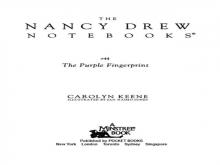 The Purple Fingerprint
The Purple Fingerprint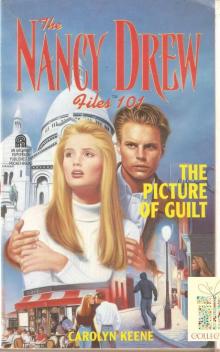 The Picture of Guilt
The Picture of Guilt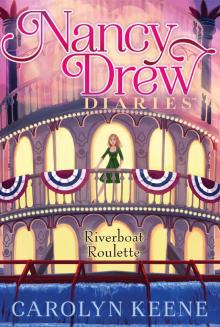 Riverboat Roulette
Riverboat Roulette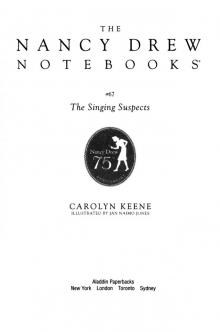 The Singing Suspects
The Singing Suspects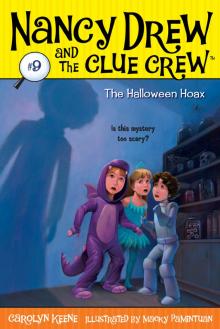 The Halloween Hoax
The Halloween Hoax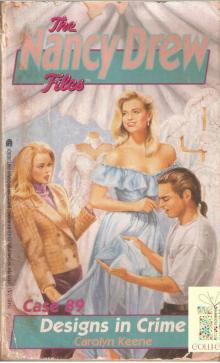 089 Designs in Crime
089 Designs in Crime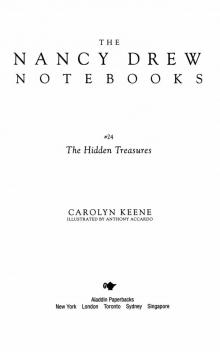 The Hidden Treasures
The Hidden Treasures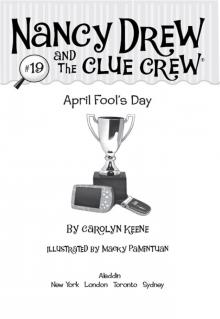 April Fool's Day
April Fool's Day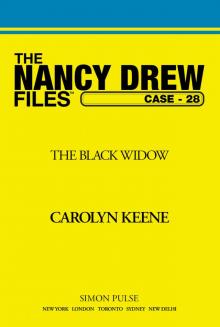 The Black Widow
The Black Widow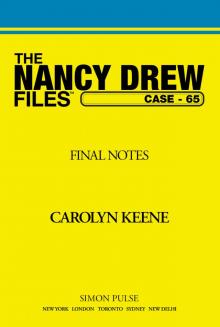 Final Notes
Final Notes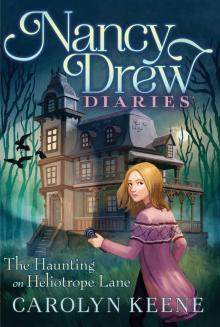 The Haunting on Heliotrope Lane
The Haunting on Heliotrope Lane The Runaway Bride
The Runaway Bride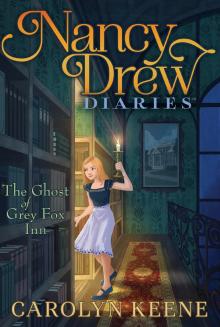 The Ghost of Grey Fox Inn
The Ghost of Grey Fox Inn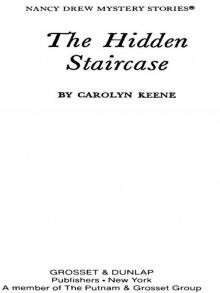 The Hidden Staircase
The Hidden Staircase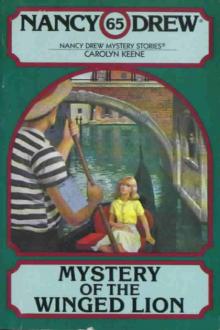 Mystery of the Winged Lion
Mystery of the Winged Lion Over the Edge
Over the Edge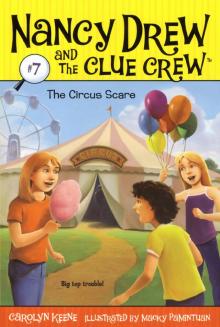 The Circus Scare
The Circus Scare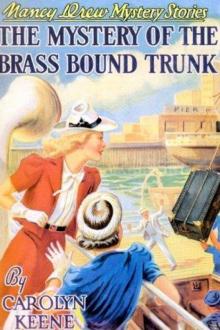 The Mystery of the Brass-Bound Trunk
The Mystery of the Brass-Bound Trunk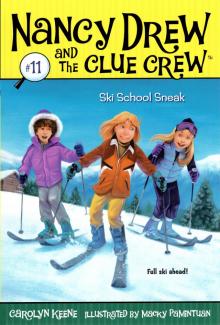 Ski School Sneak
Ski School Sneak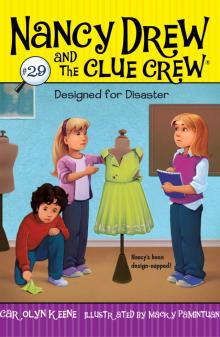 Designed for Disaster
Designed for Disaster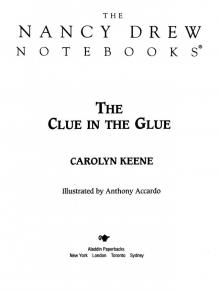 The Clue in the Glue
The Clue in the Glue Cold as Ice
Cold as Ice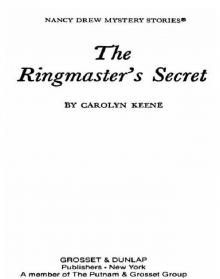 The Ringmaster's Secret
The Ringmaster's Secret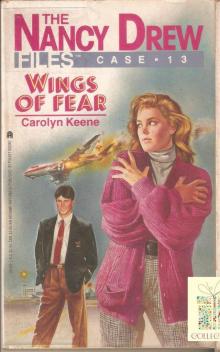 013 Wings of Fear
013 Wings of Fear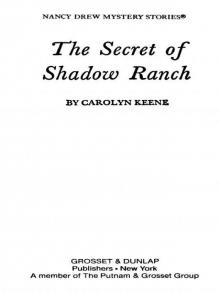 The Secret of Shadow Ranch
The Secret of Shadow Ranch Not Nice on Ice
Not Nice on Ice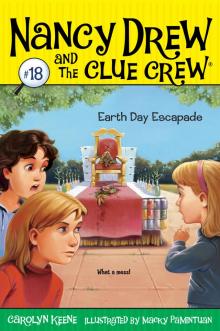 Earth Day Escapade
Earth Day Escapade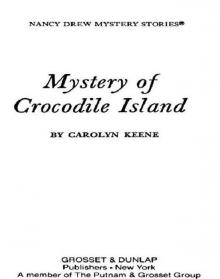 Mystery of Crocodile Island
Mystery of Crocodile Island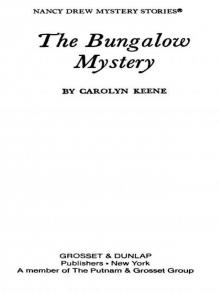 The Bungalow Mystery
The Bungalow Mystery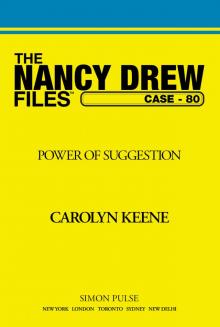 Power of Suggestion
Power of Suggestion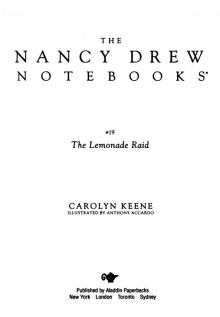 The Lemonade Raid
The Lemonade Raid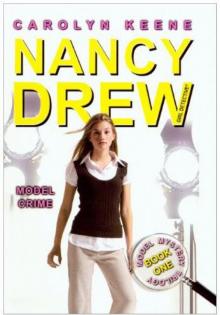 Model Crime
Model Crime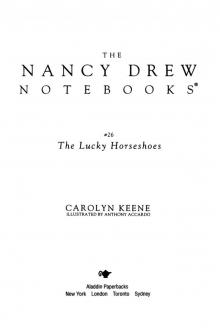 The Lucky Horseshoes
The Lucky Horseshoes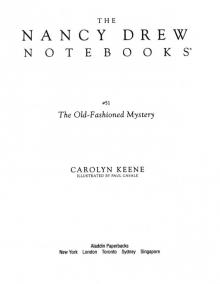 The Secret of the Old Clock
The Secret of the Old Clock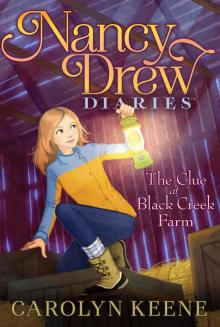 The Clue at Black Creek Farm
The Clue at Black Creek Farm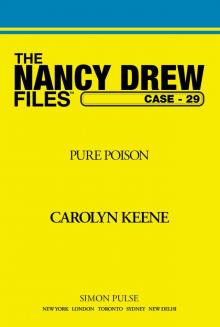 Pure Poison
Pure Poison Nobody's Business
Nobody's Business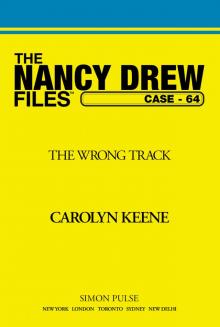 Wrong Track
Wrong Track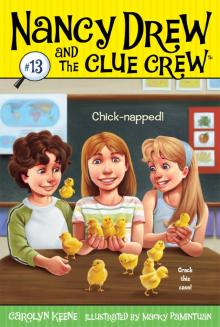 Chick-Napped!
Chick-Napped!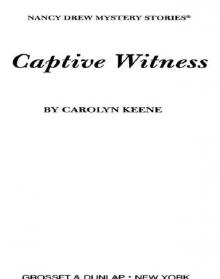 Captive Witness
Captive Witness If Looks Could Kill
If Looks Could Kill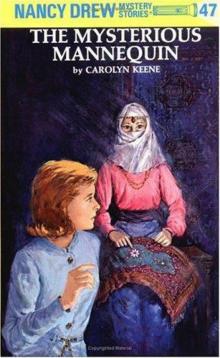 The Mysterious Mannequin
The Mysterious Mannequin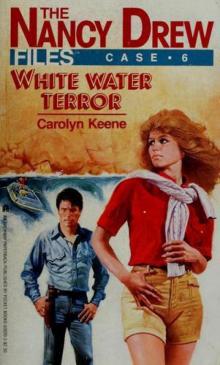 White Water Terror
White Water Terror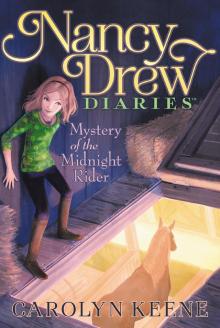 Mystery of the Midnight Rider
Mystery of the Midnight Rider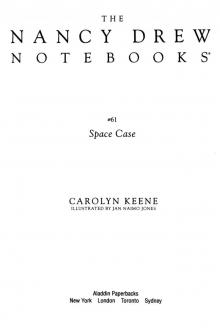 Space Case
Space Case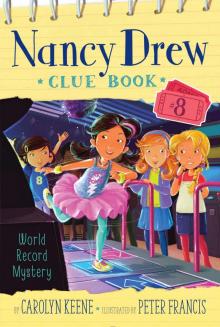 World Record Mystery
World Record Mystery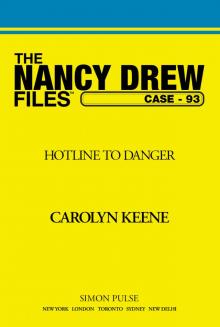 Hotline to Danger
Hotline to Danger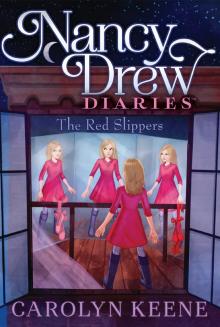 The Red Slippers
The Red Slippers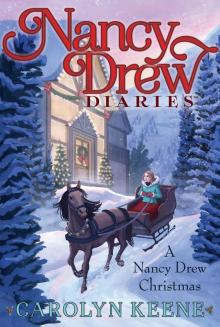 A Crime for Christmas
A Crime for Christmas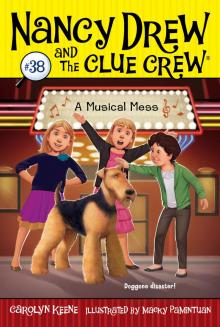 A Musical Mess
A Musical Mess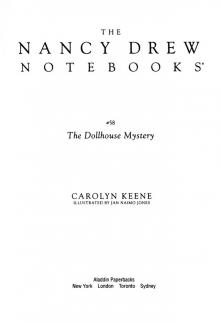 The Dollhouse Mystery
The Dollhouse Mystery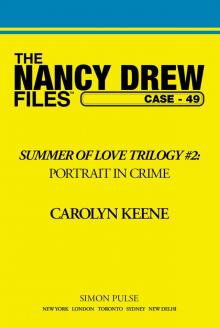 Portrait in Crime
Portrait in Crime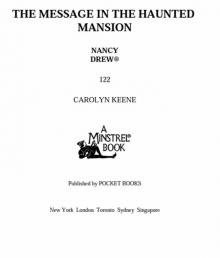 The Message in the Haunted Mansion
The Message in the Haunted Mansion Playing With Fire
Playing With Fire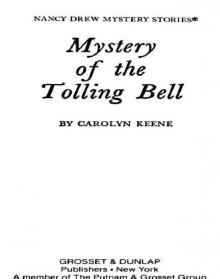 Mystery of the Tolling Bell
Mystery of the Tolling Bell Cutting Edge
Cutting Edge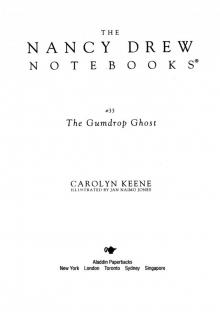 The Gumdrop Ghost
The Gumdrop Ghost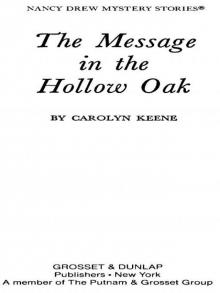 The Message in the Hollow Oak
The Message in the Hollow Oak Trial by Fire
Trial by Fire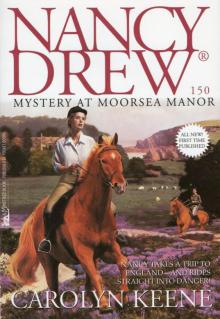 Mystery at Moorsea Manor
Mystery at Moorsea Manor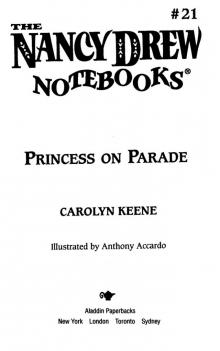 Princess on Parade
Princess on Parade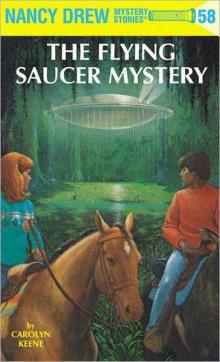 The Flying Saucer Mystery
The Flying Saucer Mystery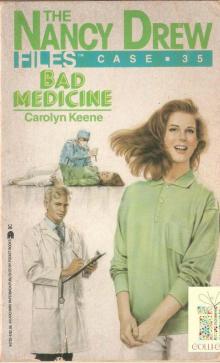 035 Bad Medicine
035 Bad Medicine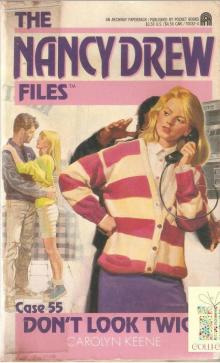 055 Don't Look Twice
055 Don't Look Twice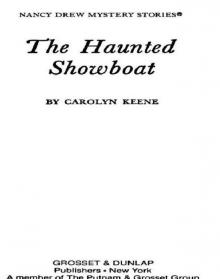 The Haunted Showboat
The Haunted Showboat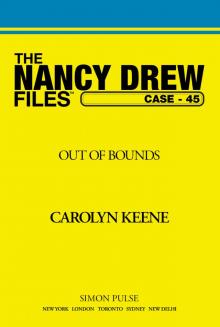 Out of Bounds
Out of Bounds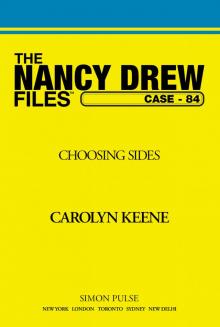 Choosing Sides
Choosing Sides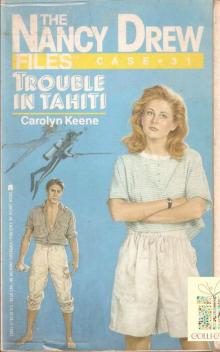 031 Trouble in Tahiti
031 Trouble in Tahiti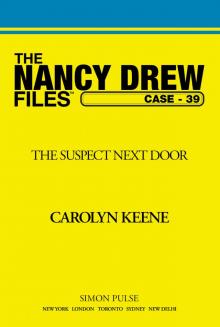 The Suspect Next Door
The Suspect Next Door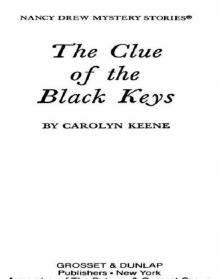 The Clue of the Black Keys
The Clue of the Black Keys The Secret Santa
The Secret Santa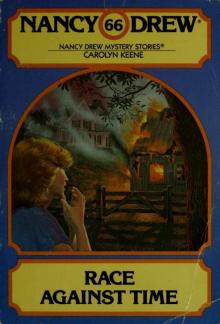 Race Against Time
Race Against Time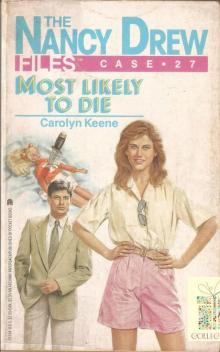 027 Most Likely to Die
027 Most Likely to Die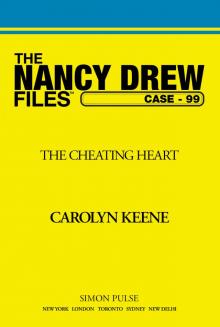 The Cheating Heart
The Cheating Heart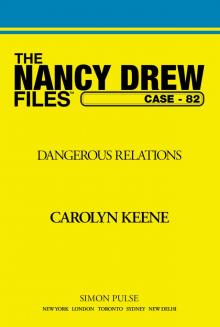 Dangerous Relations
Dangerous Relations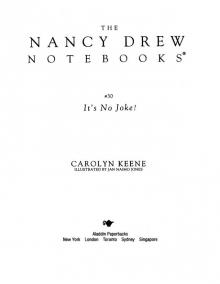 It's No Joke!
It's No Joke!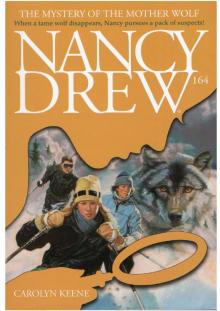 The Mystery of the Mother Wolf
The Mystery of the Mother Wolf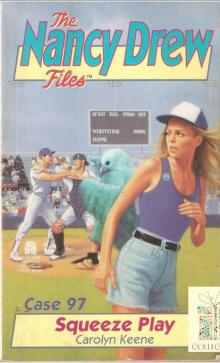 097 Squeeze Play
097 Squeeze Play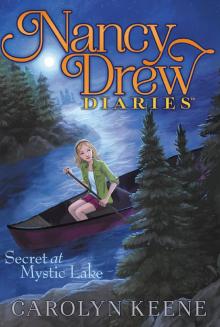 Secret at Mystic Lake
Secret at Mystic Lake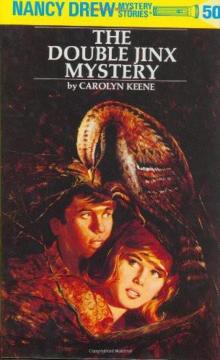 The Double Jinx Mystery
The Double Jinx Mystery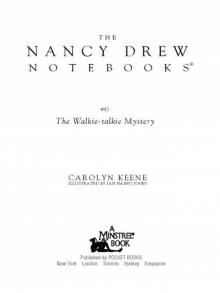 The Walkie Talkie Mystery
The Walkie Talkie Mystery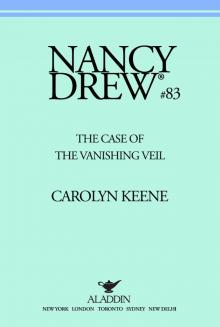 The Case of the Vanishing Veil
The Case of the Vanishing Veil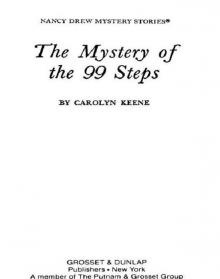 The Mystery of the 99 Steps
The Mystery of the 99 Steps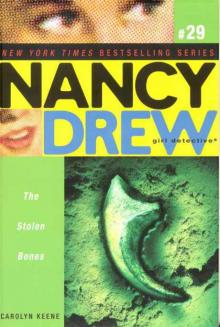 The Stolen Bones
The Stolen Bones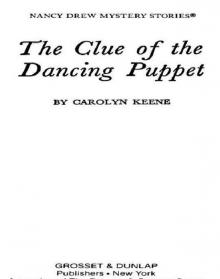 The Clue of the Dancing Puppet
The Clue of the Dancing Puppet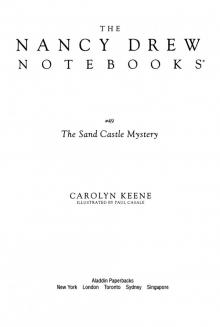 The Sand Castle Mystery
The Sand Castle Mystery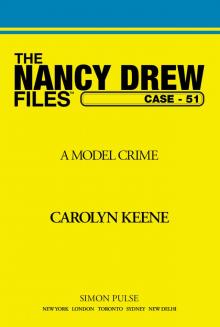 A Model Crime
A Model Crime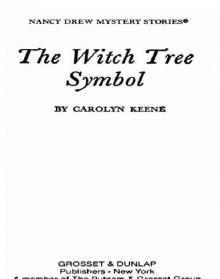 The Witch Tree Symbol
The Witch Tree Symbol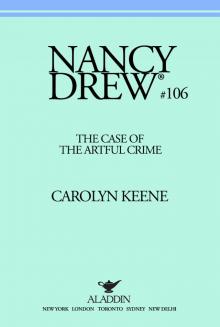 The Case of the Artful Crime
The Case of the Artful Crime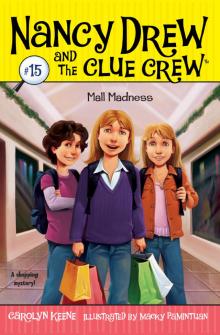 Mall Madness
Mall Madness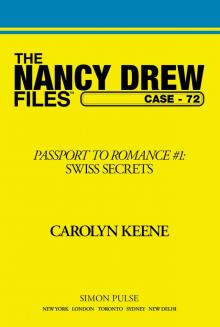 Swiss Secrets
Swiss Secrets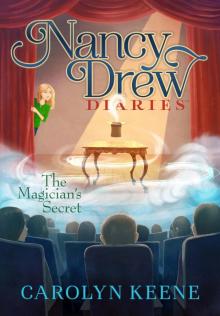 The Magician's Secret
The Magician's Secret Tall, Dark and Deadly
Tall, Dark and Deadly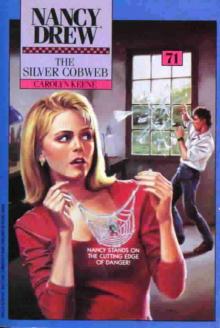 The Silver Cobweb
The Silver Cobweb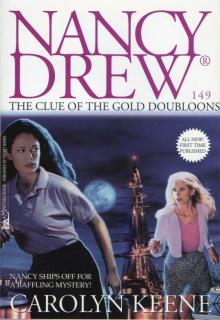 The Clue of the Gold Doubloons
The Clue of the Gold Doubloons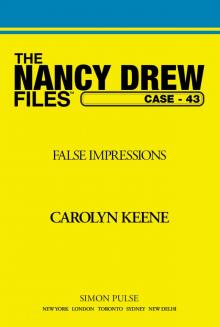 False Impressions
False Impressions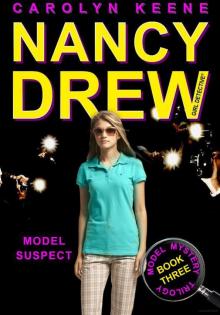 Model Suspect
Model Suspect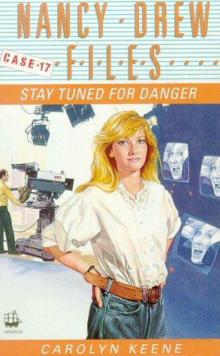 Stay Tuned for Danger
Stay Tuned for Danger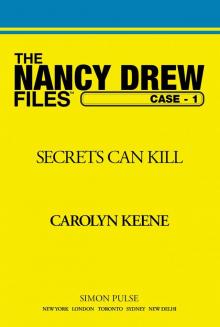 Secrets Can Kill
Secrets Can Kill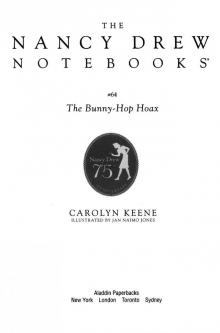 The Bunny-Hop Hoax
The Bunny-Hop Hoax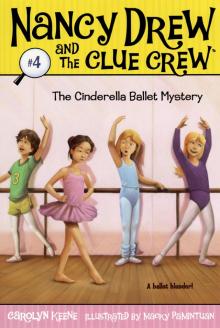 The Cinderella Ballet Mystery
The Cinderella Ballet Mystery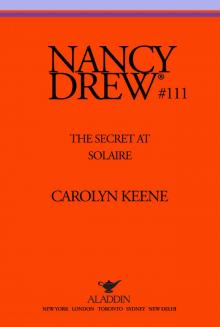 The Secret at Solaire
The Secret at Solaire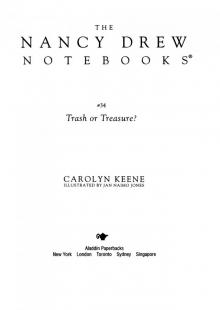 Trash or Treasure?
Trash or Treasure?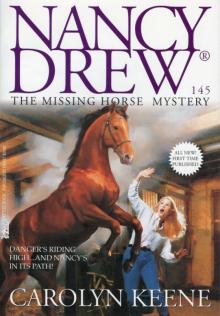 The Missing Horse Mystery
The Missing Horse Mystery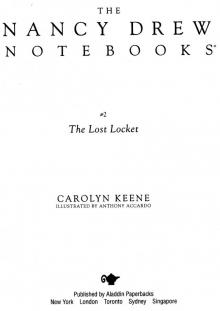 The Lost Locket
The Lost Locket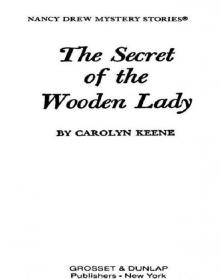 The Secret of the Wooden Lady
The Secret of the Wooden Lady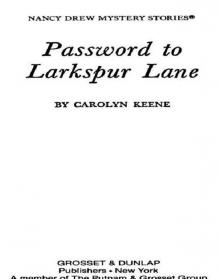 Password to Larkspur Lane
Password to Larkspur Lane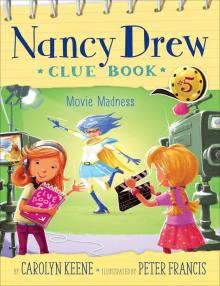 Movie Madness
Movie Madness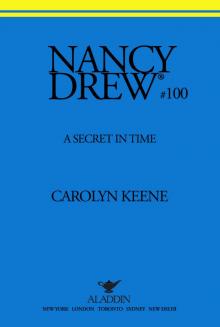 A Secret in Time
A Secret in Time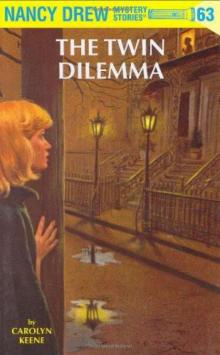 The Twin Dilemma
The Twin Dilemma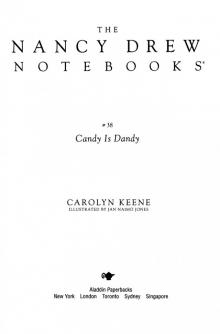 Candy Is Dandy
Candy Is Dandy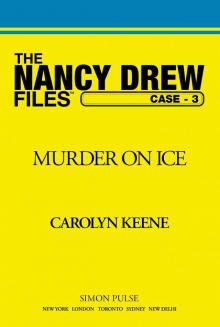 Murder on Ice
Murder on Ice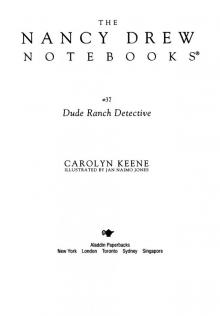 Dude Ranch Detective
Dude Ranch Detective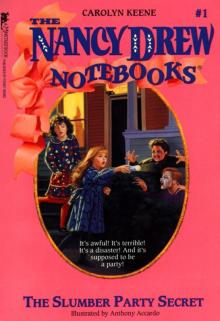 The Slumber Party Secret
The Slumber Party Secret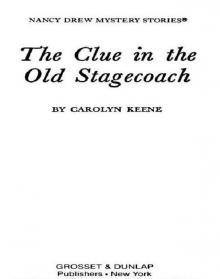 The Clue in the Old Stagecoach
The Clue in the Old Stagecoach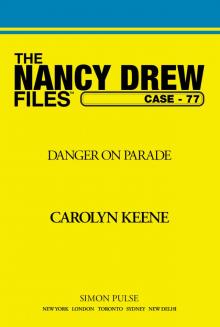 Danger on Parade
Danger on Parade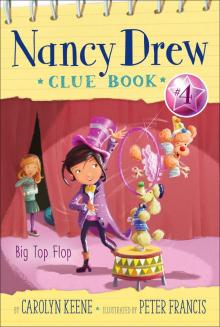 Big Top Flop
Big Top Flop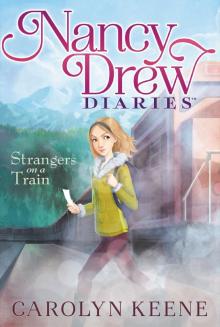 Strangers on a Train
Strangers on a Train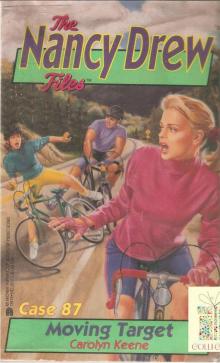 087 Moving Target
087 Moving Target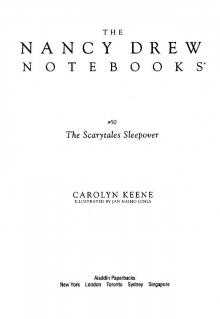 The Scarytales Sleepover
The Scarytales Sleepover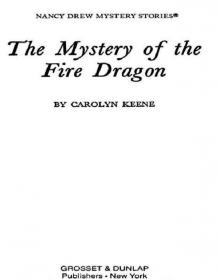 The Mystery of the Fire Dragon
The Mystery of the Fire Dragon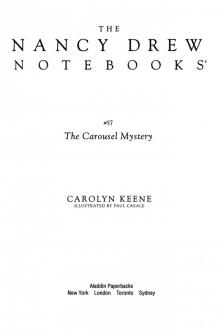 The Carousel Mystery
The Carousel Mystery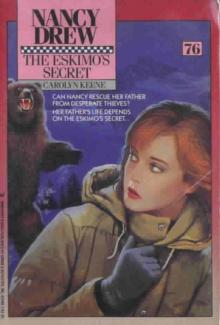 The Eskimo's Secret
The Eskimo's Secret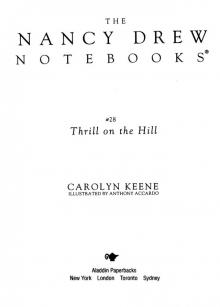 Thrill on the Hill
Thrill on the Hill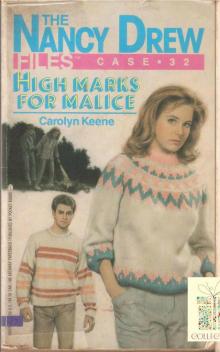 032 High Marks for Malice
032 High Marks for Malice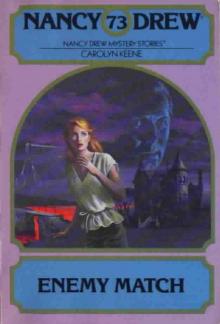 Enemy Match
Enemy Match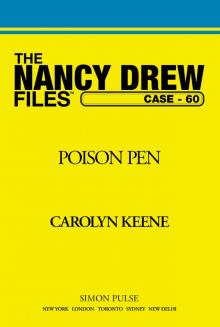 Poison Pen
Poison Pen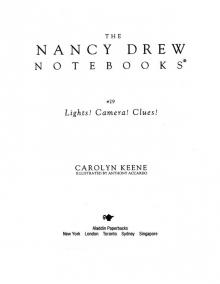 Lights, Camera . . . Cats!
Lights, Camera . . . Cats!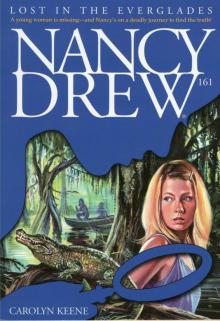 Lost in the Everglades
Lost in the Everglades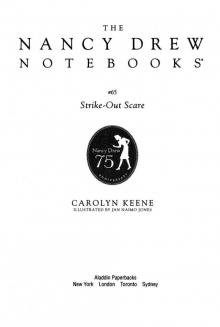 Strike-Out Scare
Strike-Out Scare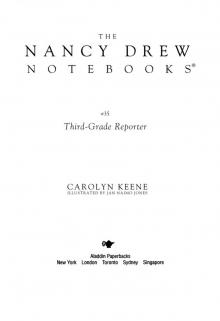 Third-Grade Reporter
Third-Grade Reporter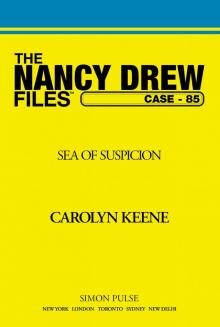 Sea of Suspicion
Sea of Suspicion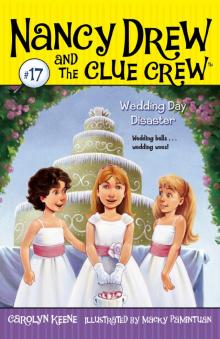 Wedding Day Disaster
Wedding Day Disaster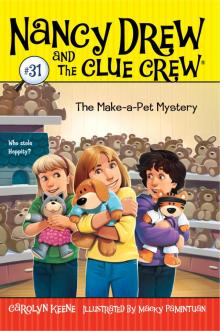 The Make-A-Pet Mystery
The Make-A-Pet Mystery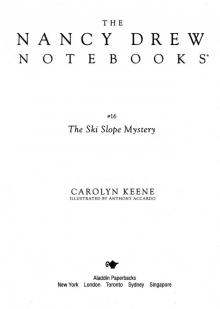 The Ski Slope Mystery
The Ski Slope Mystery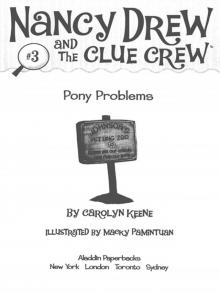 Pony Problems
Pony Problems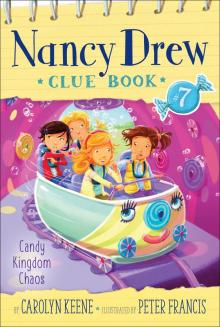 Candy Kingdom Chaos
Candy Kingdom Chaos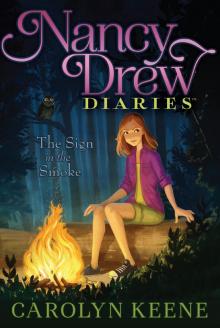 The Sign in the Smoke
The Sign in the Smoke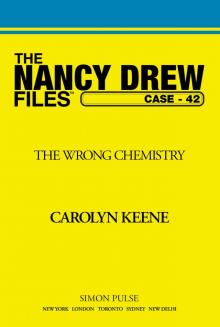 The Wrong Chemistry
The Wrong Chemistry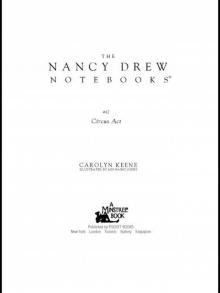 Circus Act
Circus Act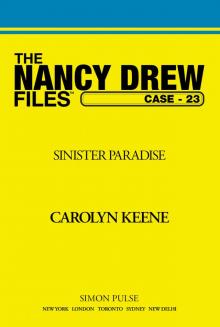 Sinister Paradise
Sinister Paradise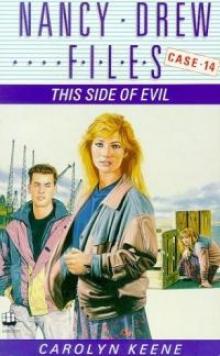 This Side of Evil
This Side of Evil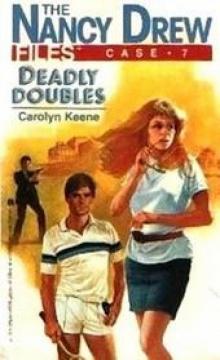 Deadly Doubles
Deadly Doubles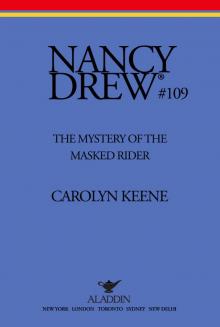 The Mystery of the Masked Rider
The Mystery of the Masked Rider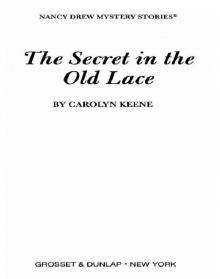 The Secret in the Old Lace
The Secret in the Old Lace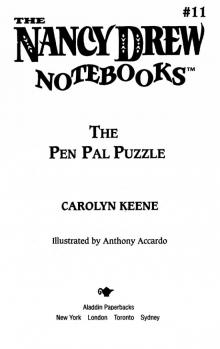 The Pen Pal Puzzle
The Pen Pal Puzzle Without a Trace
Without a Trace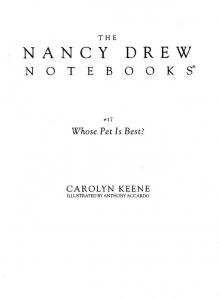 Whose Pet Is Best?
Whose Pet Is Best?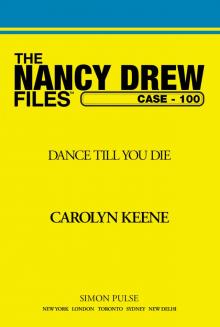 Dance Till You Die
Dance Till You Die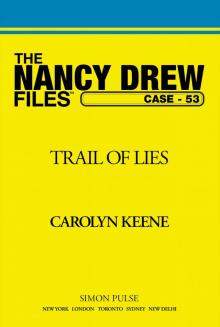 Trail of Lies
Trail of Lies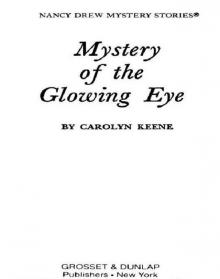 Mystery of the Glowing Eye
Mystery of the Glowing Eye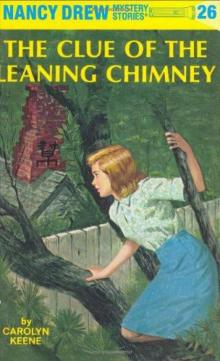 The Clue of the Leaning Chimney
The Clue of the Leaning Chimney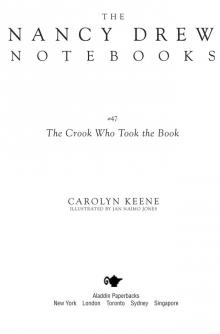 The Crook Who Took the Book
The Crook Who Took the Book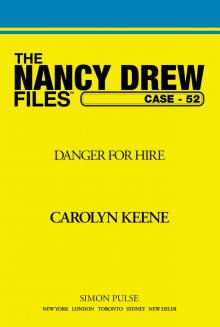 Danger for Hire
Danger for Hire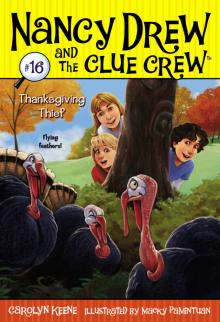 Thanksgiving Thief
Thanksgiving Thief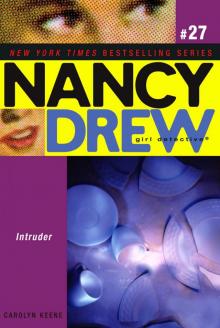 Intruder!
Intruder!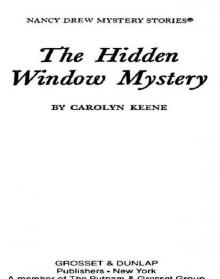 The Hidden Window Mystery
The Hidden Window Mystery Win, Place or Die
Win, Place or Die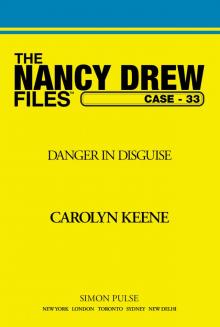 Danger in Disguise
Danger in Disguise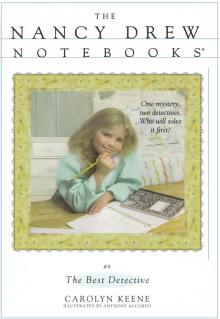 The Best Detective
The Best Detective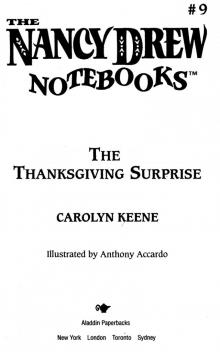 The Thanksgiving Surprise
The Thanksgiving Surprise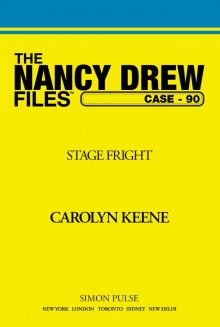 Stage Fright
Stage Fright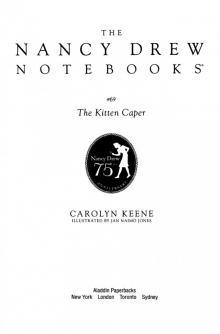 The Kitten Caper
The Kitten Caper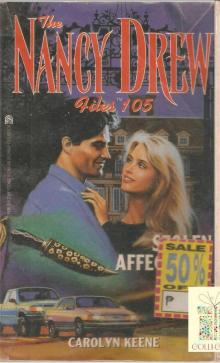 Stolen Affections
Stolen Affections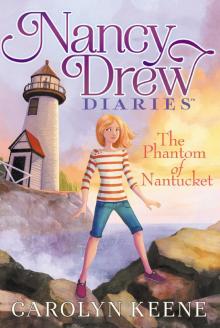 The Phantom of Nantucket
The Phantom of Nantucket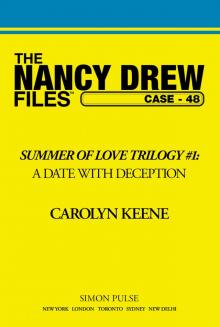 Date With Deception
Date With Deception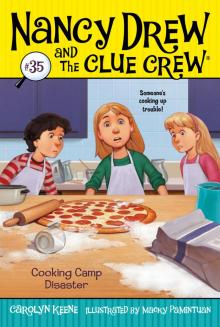 Cooking Camp Disaster
Cooking Camp Disaster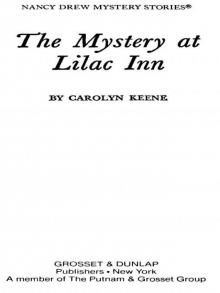 The Mystery at Lilac Inn
The Mystery at Lilac Inn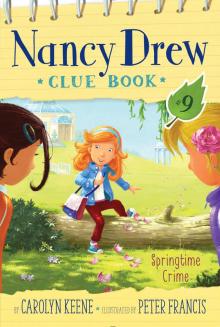 Springtime Crime
Springtime Crime Action!
Action! Into Thin Air
Into Thin Air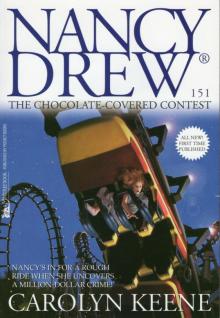 The Chocolate-Covered Contest
The Chocolate-Covered Contest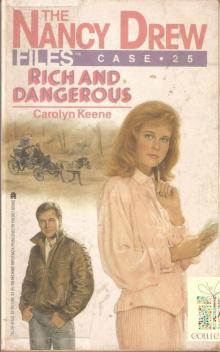 025 Rich and Dangerous
025 Rich and Dangerous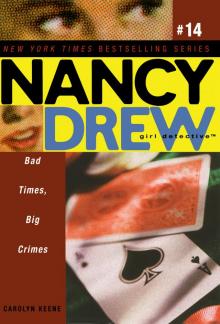 Bad Times, Big Crimes
Bad Times, Big Crimes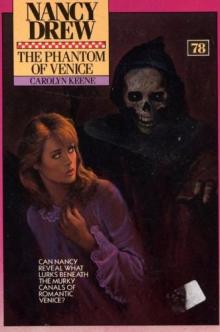 078 The Phantom Of Venice
078 The Phantom Of Venice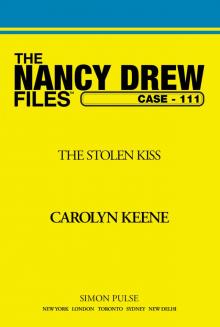 The Stolen Kiss
The Stolen Kiss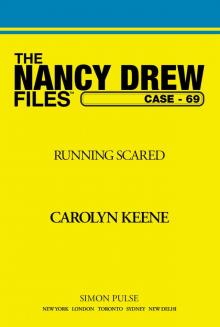 Running Scared
Running Scared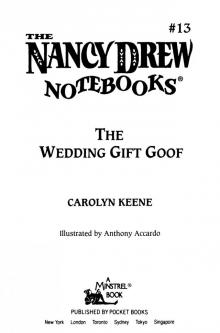 The Wedding Gift Goof
The Wedding Gift Goof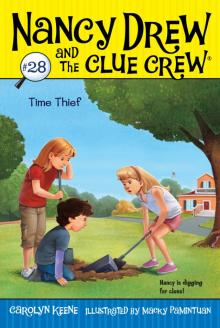 Time Thief
Time Thief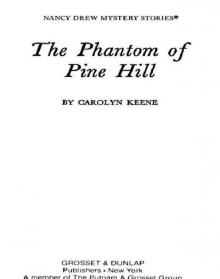 The Phantom of Pine Hill
The Phantom of Pine Hill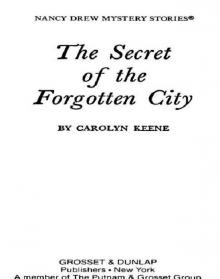 The Secret of the Forgotten City
The Secret of the Forgotten City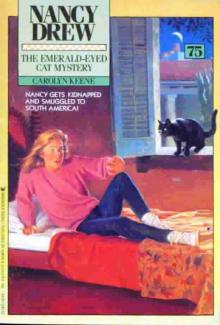 The Emerald-Eyed Cat Mystery
The Emerald-Eyed Cat Mystery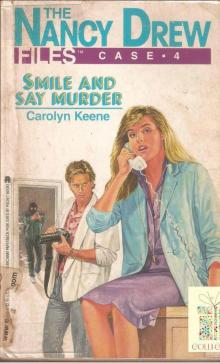 004 Smile and Say Murder
004 Smile and Say Murder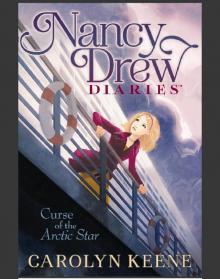 Curse of the Arctic Star
Curse of the Arctic Star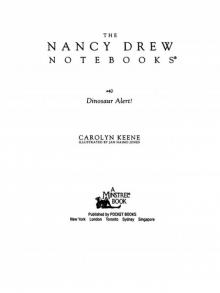 Dinosaur Alert!
Dinosaur Alert!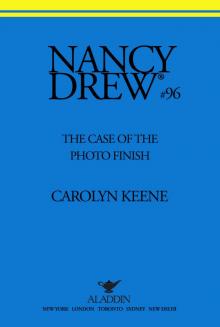 The Case of the Photo Finish
The Case of the Photo Finish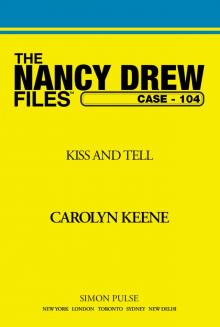 Kiss and Tell
Kiss and Tell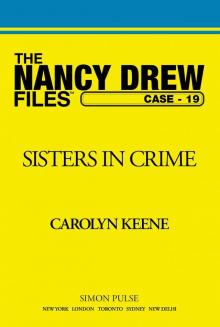 Sisters in Crime
Sisters in Crime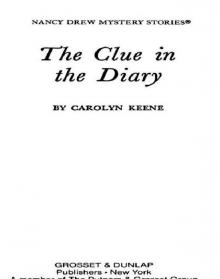 The Clue in the Diary
The Clue in the Diary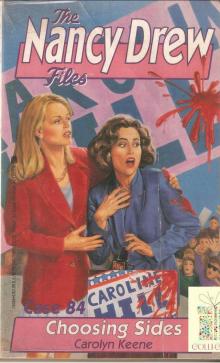 084 Choosing Sides
084 Choosing Sides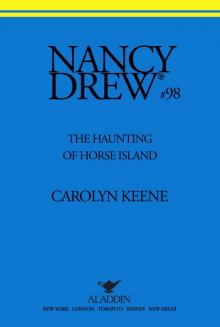 Haunting of Horse Island
Haunting of Horse Island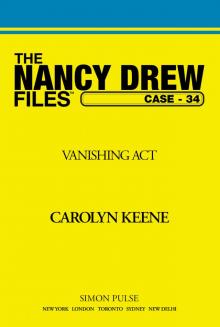 Vanishing Act
Vanishing Act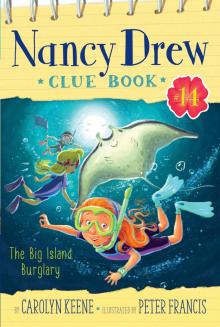 The Big Island Burglary
The Big Island Burglary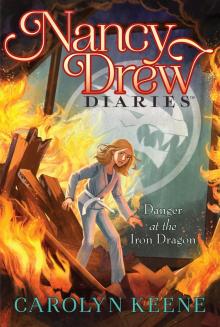 Danger at the Iron Dragon
Danger at the Iron Dragon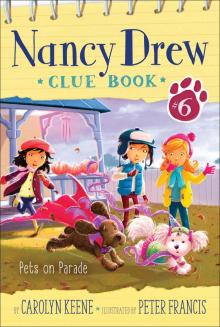 Pets on Parade
Pets on Parade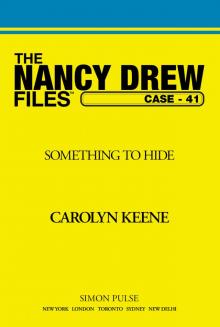 Something to Hide
Something to Hide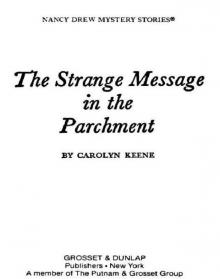 The Strange Message in the Parchment
The Strange Message in the Parchment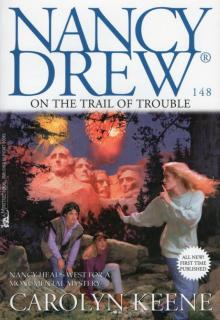 On the Trail of Trouble
On the Trail of Trouble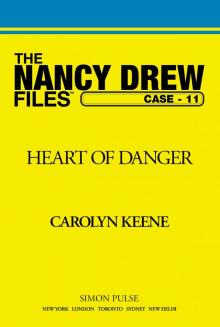 Heart of Danger
Heart of Danger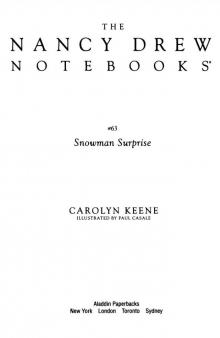 The Snowman Surprise
The Snowman Surprise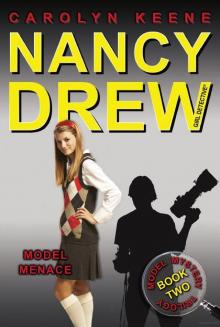 Model Menace
Model Menace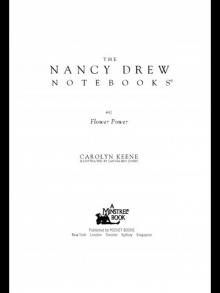 Flower Power
Flower Power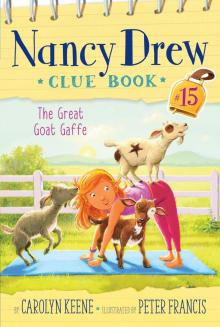 The Great Goat Gaffe
The Great Goat Gaffe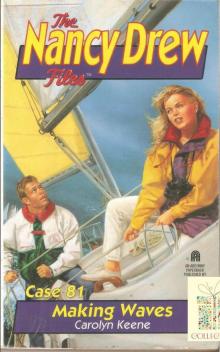 081 Making Waves
081 Making Waves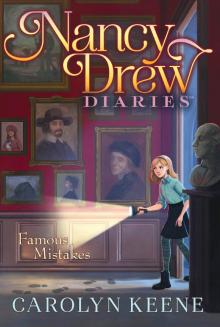 Famous Mistakes
Famous Mistakes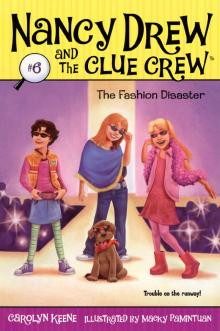 The Fashion Disaster
The Fashion Disaster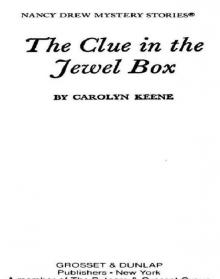 The Clue in the Jewel Box
The Clue in the Jewel Box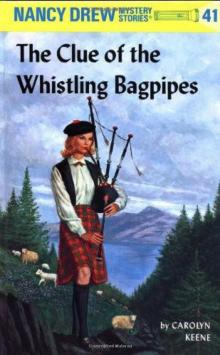 The Clue of the Whistling Bagpipes
The Clue of the Whistling Bagpipes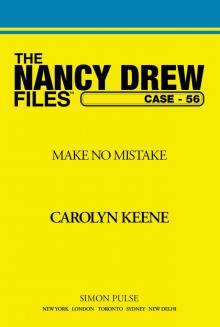 Make No Mistake
Make No Mistake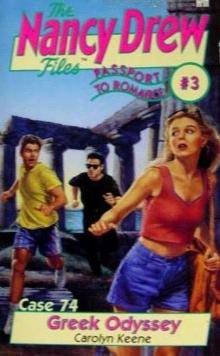 Greek Odyssey
Greek Odyssey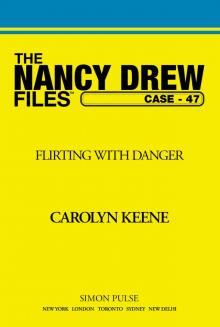 Flirting With Danger
Flirting With Danger Double Take
Double Take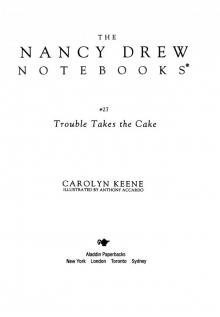 Trouble Takes the Cake
Trouble Takes the Cake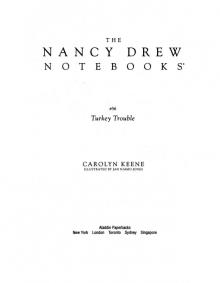 Turkey Trouble
Turkey Trouble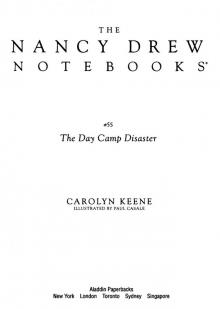 The Day Camp Disaster
The Day Camp Disaster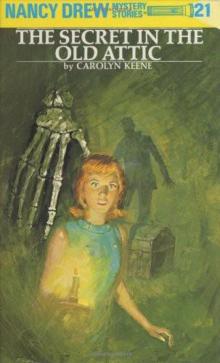 The Secret in the Old Attic
The Secret in the Old Attic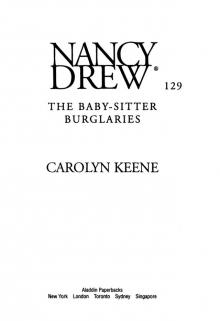 The Baby-Sitter Burglaries
The Baby-Sitter Burglaries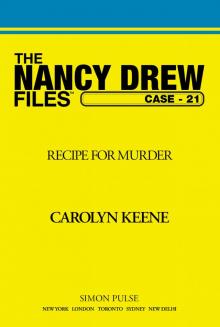 Recipe for Murder
Recipe for Murder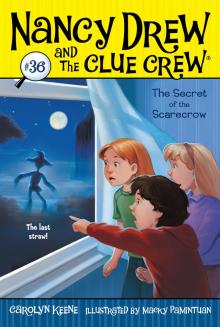 The Secret of the Scarecrow
The Secret of the Scarecrow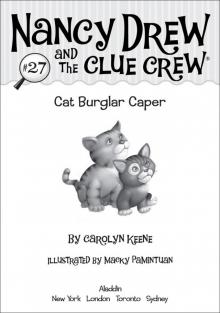 Cat Burglar Caper
Cat Burglar Caper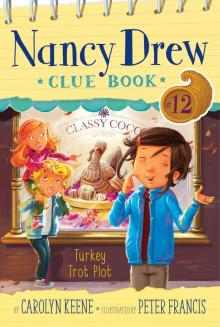 Turkey Trot Plot
Turkey Trot Plot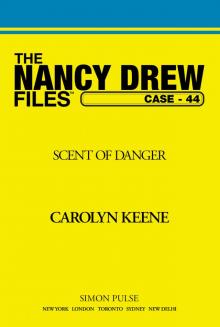 Scent of Danger
Scent of Danger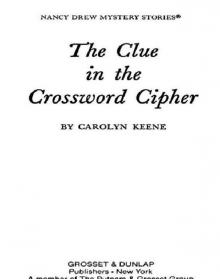 The Clue in the Crossword Cipher
The Clue in the Crossword Cipher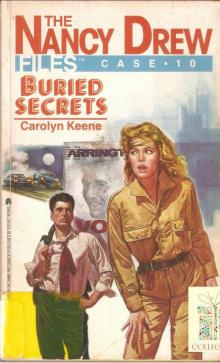 010 Buried Secrets
010 Buried Secrets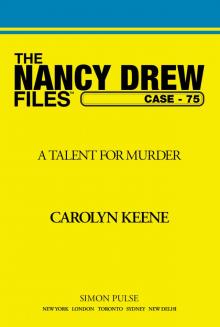 A Talent for Murder
A Talent for Murder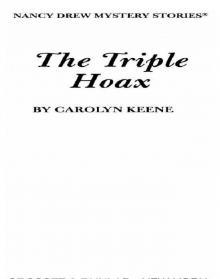 The Triple Hoax
The Triple Hoax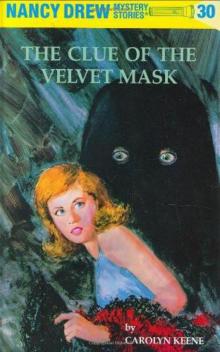 The Clue of the Velvet Mask
The Clue of the Velvet Mask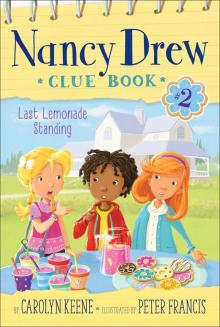 Last Lemonade Standing
Last Lemonade Standing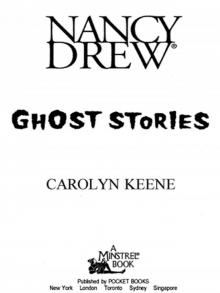 The Ghost of Blackwood Hall
The Ghost of Blackwood Hall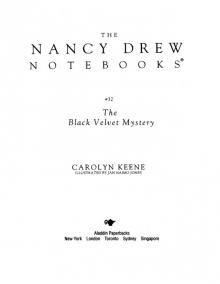 The Black Velvet Mystery
The Black Velvet Mystery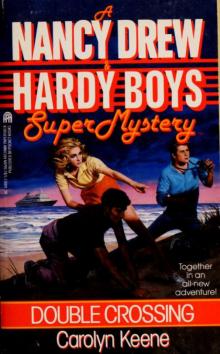 Double Crossing
Double Crossing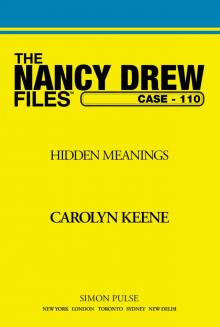 Hidden Meanings
Hidden Meanings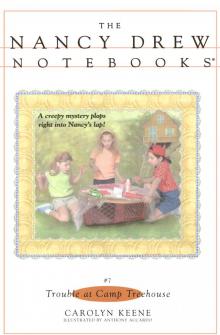 Trouble at Camp Treehouse
Trouble at Camp Treehouse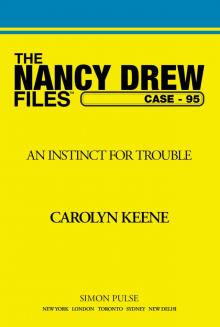 An Instinct for Trouble
An Instinct for Trouble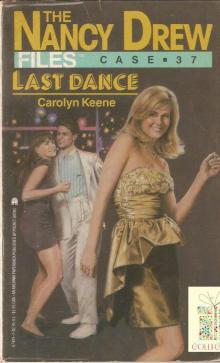 037 Last Dance
037 Last Dance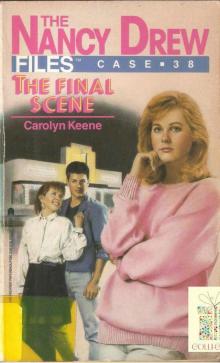 038 The Final Scene
038 The Final Scene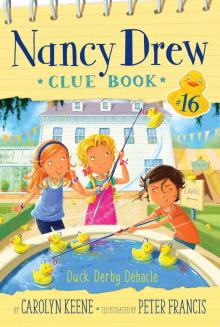 Duck Derby Debacle
Duck Derby Debacle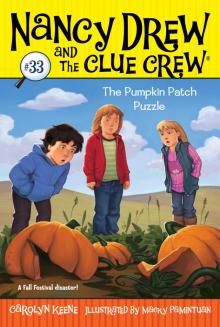 The Pumpkin Patch Puzzle
The Pumpkin Patch Puzzle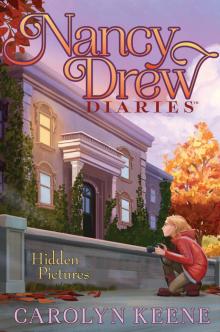 Hidden Pictures
Hidden Pictures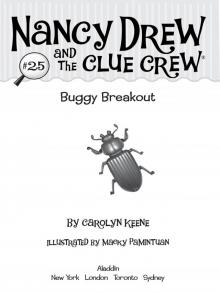 Buggy Breakout
Buggy Breakout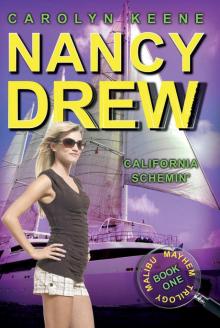 California Schemin'
California Schemin'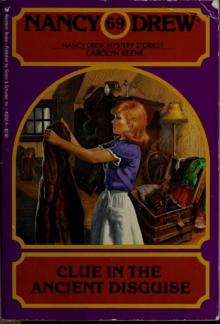 Clue in the Ancient Disguise
Clue in the Ancient Disguise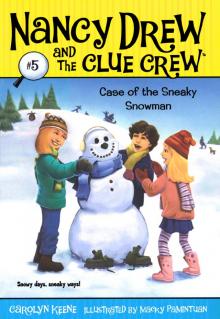 Case of the Sneaky Snowman
Case of the Sneaky Snowman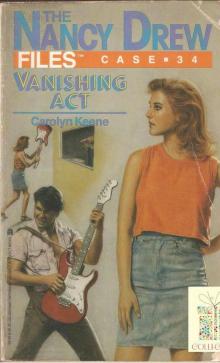 034 Vanishing Act
034 Vanishing Act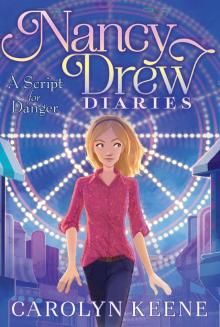 A Script for Danger
A Script for Danger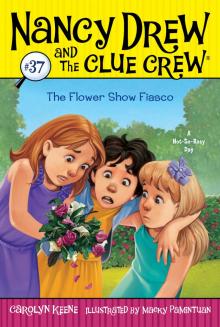 The Flower Show Fiasco
The Flower Show Fiasco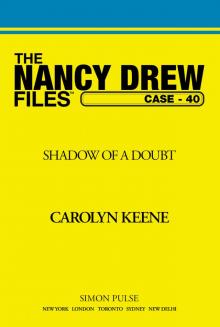 Shadow of a Doubt
Shadow of a Doubt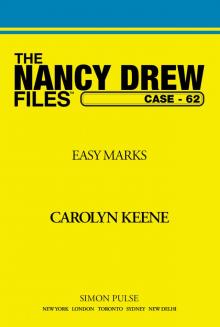 Easy Marks
Easy Marks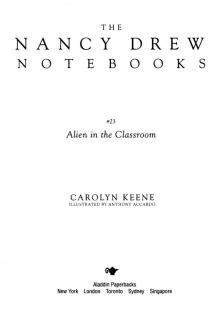 Alien in the Classroom
Alien in the Classroom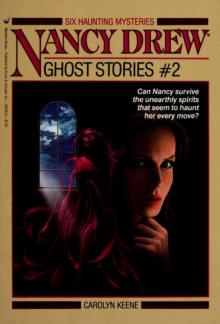 Ghost Stories, #2 (Nancy Drew)
Ghost Stories, #2 (Nancy Drew)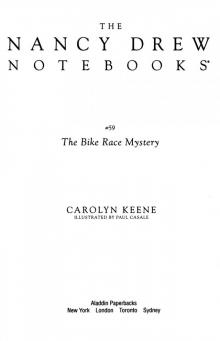 The Bike Race Mystery
The Bike Race Mystery False Pretenses
False Pretenses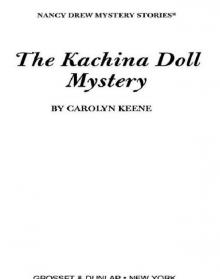 The Kachina Doll Mystery
The Kachina Doll Mystery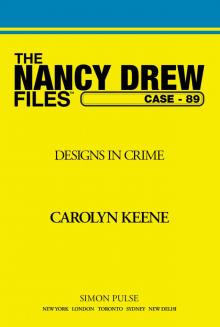 Designs in Crime
Designs in Crime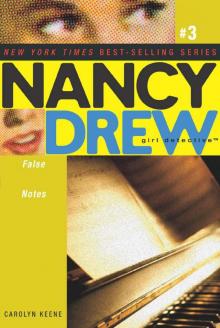 False Notes
False Notes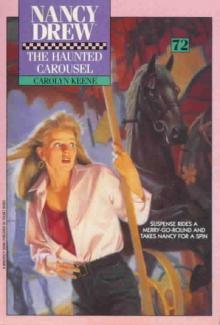 The Haunted Carousel
The Haunted Carousel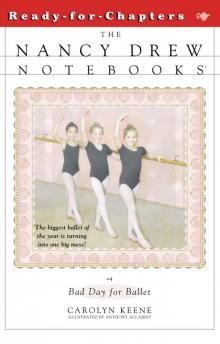 Bad Day for Ballet
Bad Day for Ballet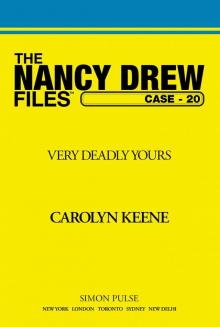 Very Deadly Yours
Very Deadly Yours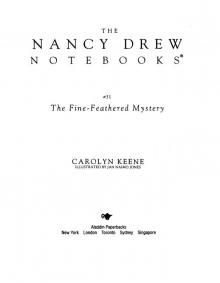 The Fine-Feathered Mystery
The Fine-Feathered Mystery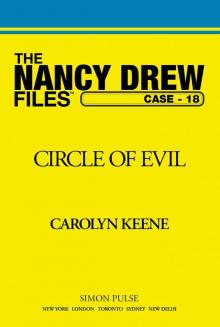 Circle of Evil
Circle of Evil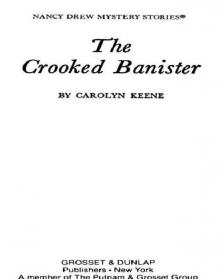 The Crooked Banister
The Crooked Banister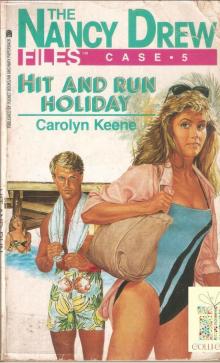 005 Hit and Run Holiday
005 Hit and Run Holiday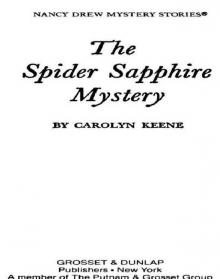 The Spider Sapphire Mystery
The Spider Sapphire Mystery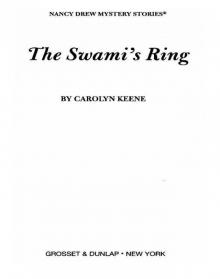 The Swami's Ring
The Swami's Ring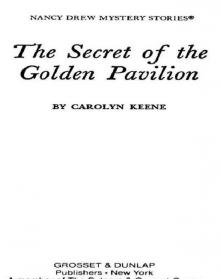 The Secret of the Golden Pavilion
The Secret of the Golden Pavilion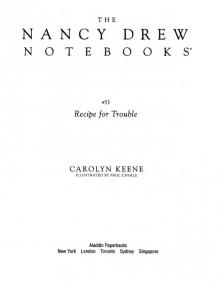 Recipe for Trouble
Recipe for Trouble Betrayed by Love
Betrayed by Love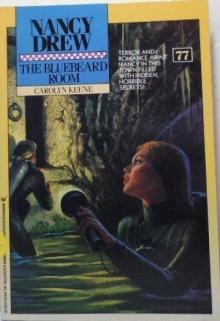 The Bluebeard Room
The Bluebeard Room Sweet Revenge
Sweet Revenge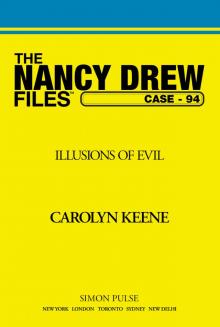 Illusions of Evil
Illusions of Evil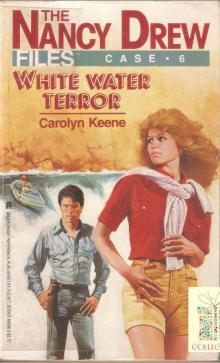 006 White Water Terror
006 White Water Terror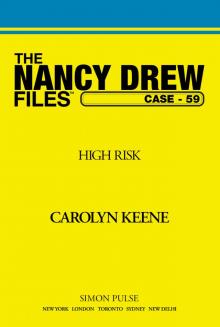 High Risk
High Risk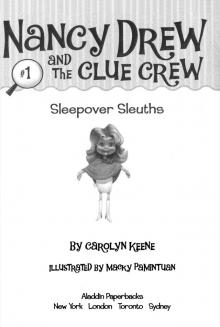 Sleepover Sleuths
Sleepover Sleuths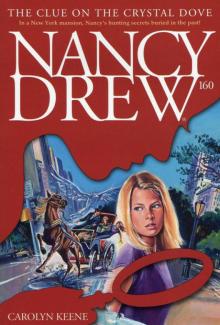 The Clue on the Crystal Dove
The Clue on the Crystal Dove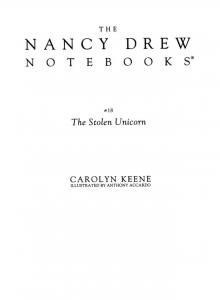 The Stolen Unicorn
The Stolen Unicorn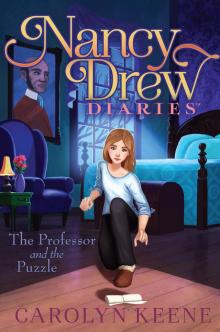 The Professor and the Puzzle
The Professor and the Puzzle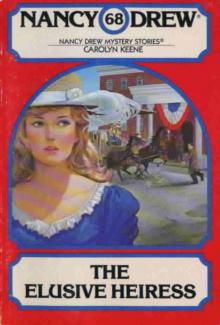 The Elusive Heiress
The Elusive Heiress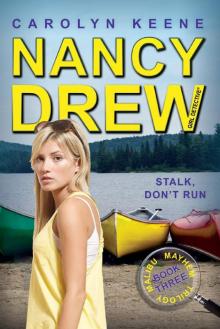 Stalk, Don't Run
Stalk, Don't Run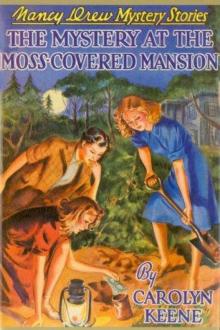 The Mystery at the Moss-Covered Mansion
The Mystery at the Moss-Covered Mansion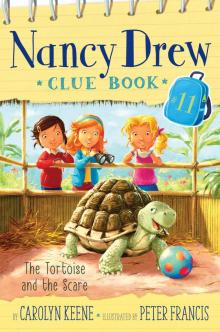 The Tortoise and the Scare
The Tortoise and the Scare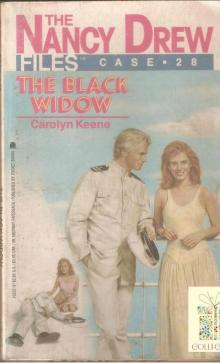 028 The Black Widow
028 The Black Widow Big Worry in Wonderland
Big Worry in Wonderland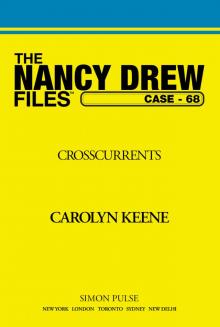 Crosscurrents
Crosscurrents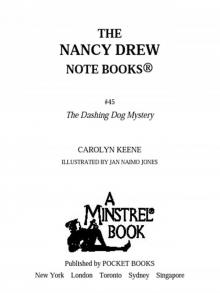 The Dashing Dog Mystery
The Dashing Dog Mystery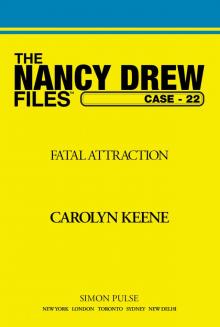 Fatal Attraction
Fatal Attraction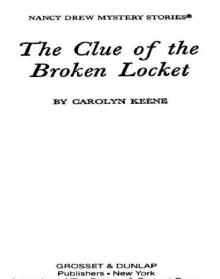 The Clue of the Broken Locket
The Clue of the Broken Locket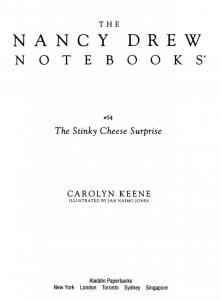 The Stinky Cheese Surprise
The Stinky Cheese Surprise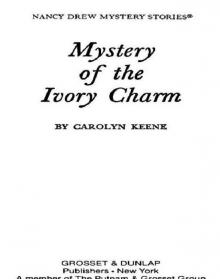 Mystery of the Ivory Charm
Mystery of the Ivory Charm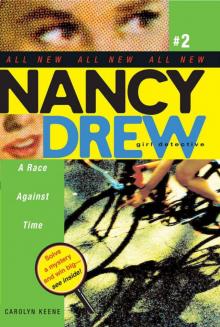 A Race Against Time
A Race Against Time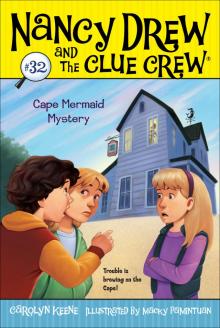 Cape Mermaid Mystery
Cape Mermaid Mystery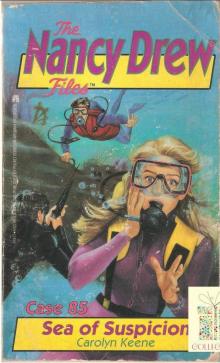 085 Sea of Suspicion
085 Sea of Suspicion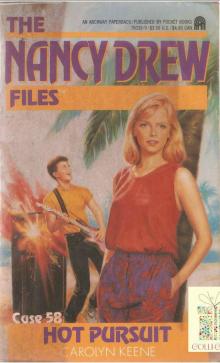 058 Hot Pursuit
058 Hot Pursuit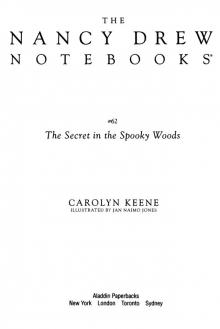 The Secret in the Spooky Woods
The Secret in the Spooky Woods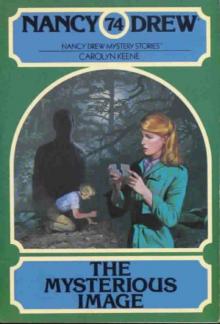 The Mysterious Image
The Mysterious Image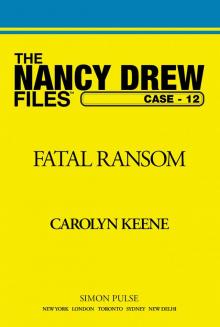 Fatal Ransom
Fatal Ransom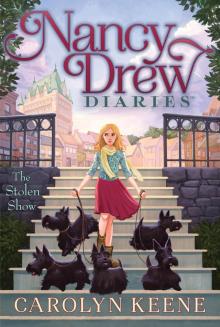 The Stolen Show
The Stolen Show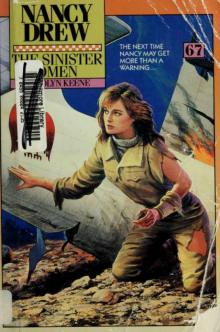 The Sinister Omen
The Sinister Omen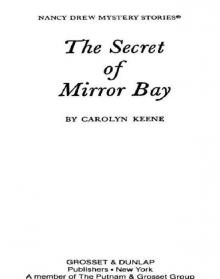 The Secret of Mirror Bay
The Secret of Mirror Bay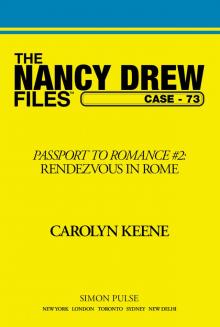 Rendezvous in Rome
Rendezvous in Rome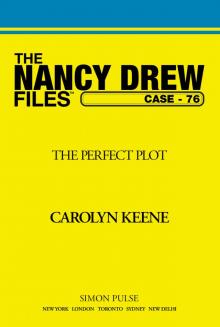 The Perfect Plot
The Perfect Plot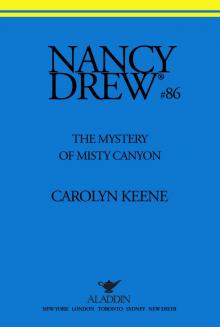 The Mystery of Misty Canyon
The Mystery of Misty Canyon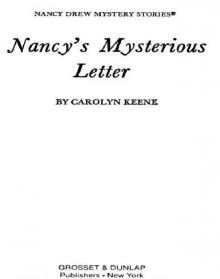 Nancy's Mysterious Letter
Nancy's Mysterious Letter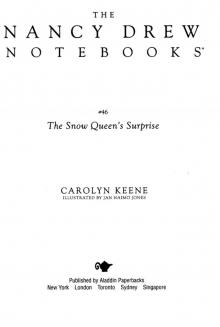 The Snow Queen's Surprise
The Snow Queen's Surprise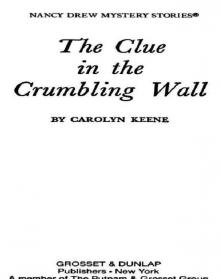 The Clue in the Crumbling Wall
The Clue in the Crumbling Wall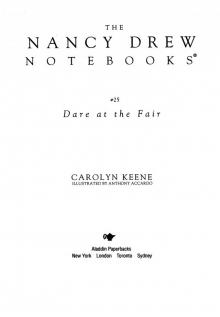 Dare at the Fair
Dare at the Fair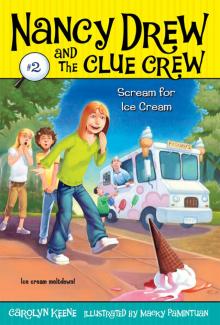 Scream for Ice Cream
Scream for Ice Cream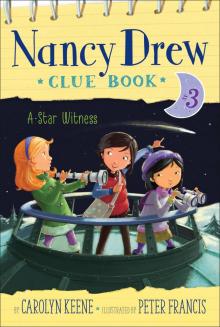 A Star Witness
A Star Witness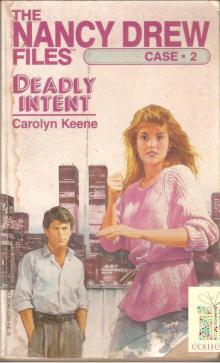 002 Deadly Intent
002 Deadly Intent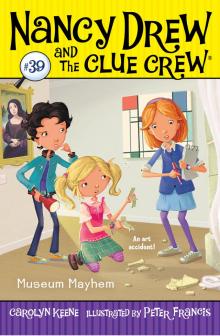 Museum Mayhem
Museum Mayhem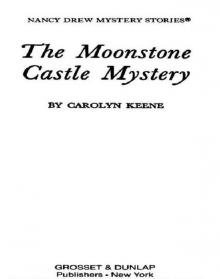 The Moonstone Castle Mystery
The Moonstone Castle Mystery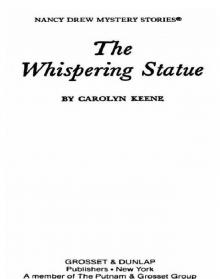 The Whispering Statue
The Whispering Statue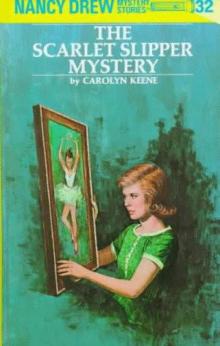 The Scarlet Slipper Mystery
The Scarlet Slipper Mystery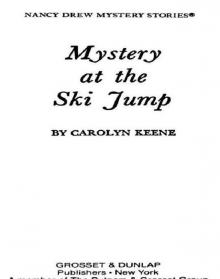 Mystery at the Ski Jump
Mystery at the Ski Jump Hot Pursuit
Hot Pursuit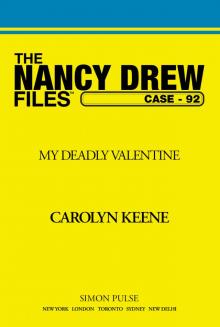 My Deadly Valentine
My Deadly Valentine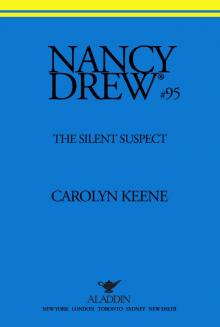 The Silent Suspect
The Silent Suspect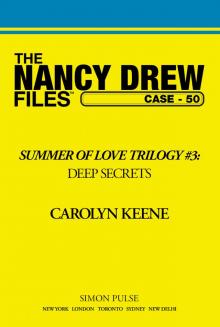 Deep Secrets
Deep Secrets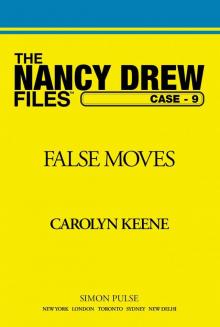 False Moves
False Moves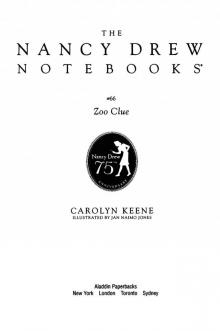 The Zoo Crew
The Zoo Crew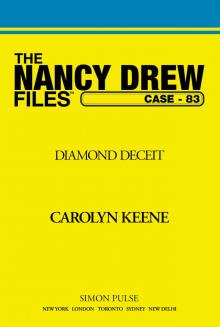 Diamond Deceit
Diamond Deceit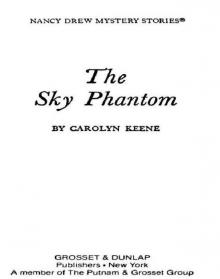 The Sky Phantom
The Sky Phantom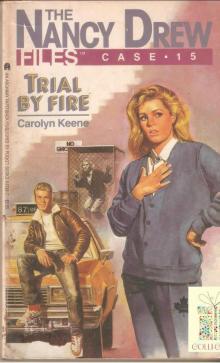 015 Trial by Fire
015 Trial by Fire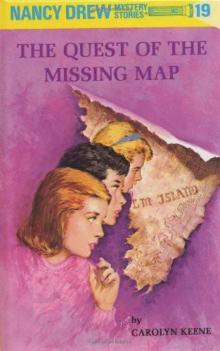 The Quest of the Missing Map
The Quest of the Missing Map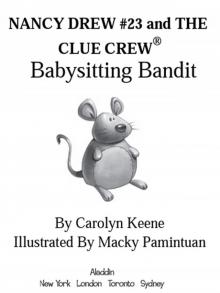 Babysitting Bandit
Babysitting Bandit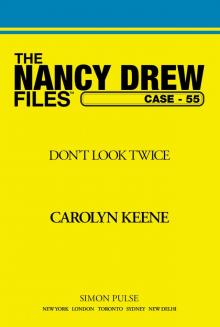 Don't Look Twice
Don't Look Twice Never Say Die
Never Say Die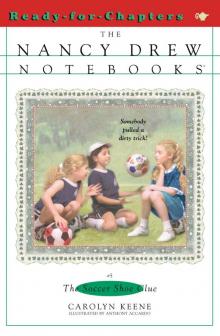 The Soccer Shoe Clue
The Soccer Shoe Clue Pool Party Puzzler
Pool Party Puzzler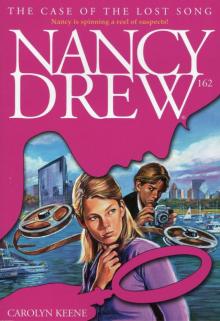 The Case of the Lost Song
The Case of the Lost Song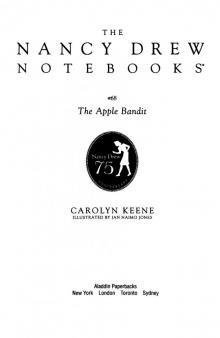 The Apple Bandit
The Apple Bandit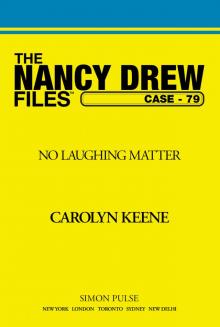 No Laughing Matter
No Laughing Matter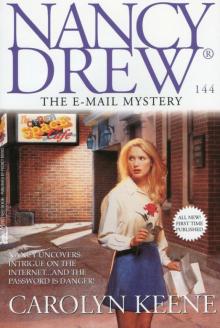 The Thirteenth Pearl
The Thirteenth Pearl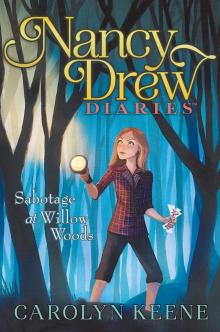 Sabotage at Willow Woods
Sabotage at Willow Woods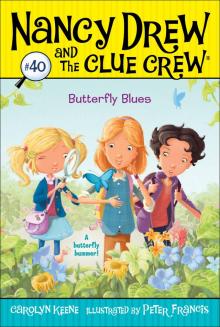 Butterfly Blues
Butterfly Blues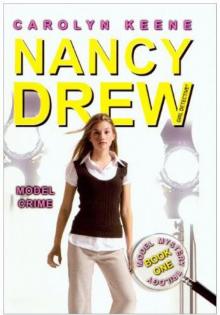 Model Crime 1
Model Crime 1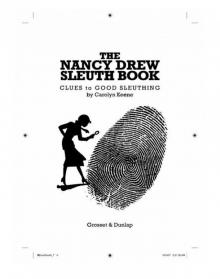 The Nancy Drew Sleuth Book
The Nancy Drew Sleuth Book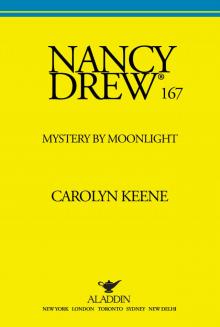 Mystery by Moonlight
Mystery by Moonlight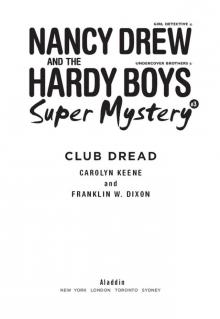 Club Dread
Club Dread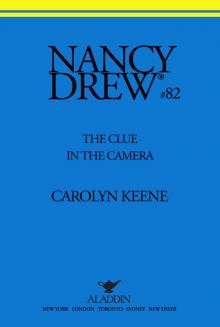 The Clue in the Camera
The Clue in the Camera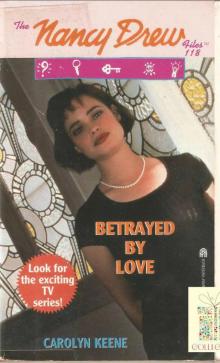 118 Betrayed By Love
118 Betrayed By Love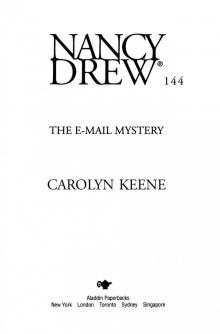 The E-Mail Mystery (Nancy Drew Book 144)
The E-Mail Mystery (Nancy Drew Book 144)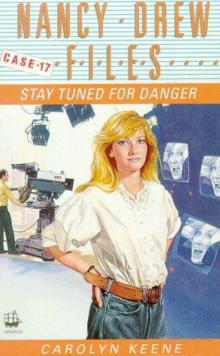 Stay Tuned for Danger: Circle of Evil
Stay Tuned for Danger: Circle of Evil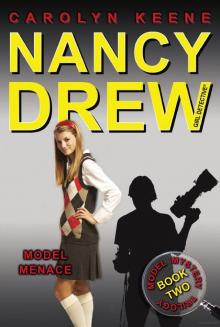 Model Menace 2
Model Menace 2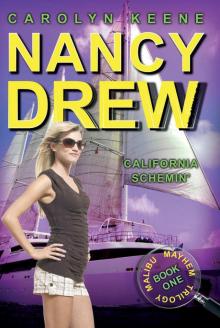 California Schemin': Book One in the Malibu Mayhem Trilogy
California Schemin': Book One in the Malibu Mayhem Trilogy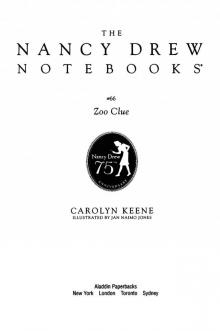 Zoo Clue (Nancy Drew Notebooks)
Zoo Clue (Nancy Drew Notebooks)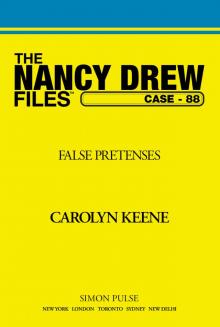 False Pretences
False Pretences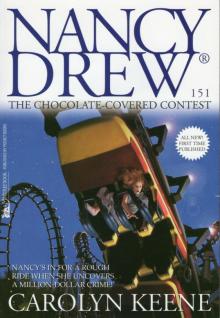 151 The Chocolate-Covered Contest
151 The Chocolate-Covered Contest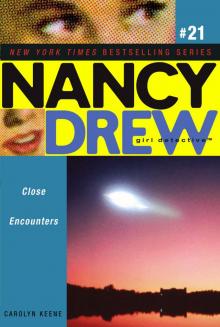 Close Encounters
Close Encounters The Emeral-Eyed Cat Mystery
The Emeral-Eyed Cat Mystery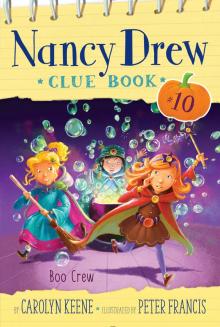 Boo Crew
Boo Crew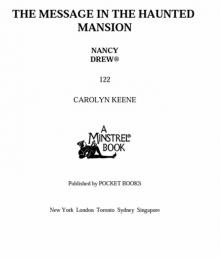 The Message in the Haunted Mansion (Nancy Drew Book 122)
The Message in the Haunted Mansion (Nancy Drew Book 122)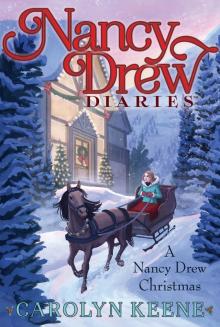 A Nancy Drew Christmas
A Nancy Drew Christmas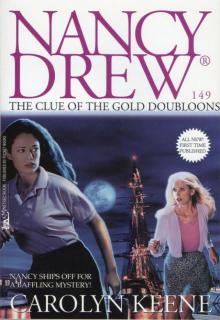 149 The Clue Of The Gold Doubloons
149 The Clue Of The Gold Doubloons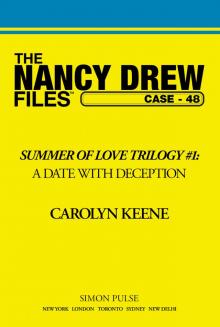 A Date with Deception
A Date with Deception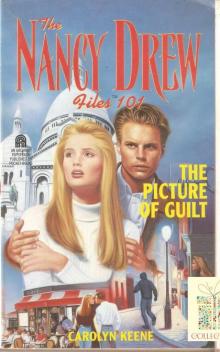 101 The Picture of Guilt
101 The Picture of Guilt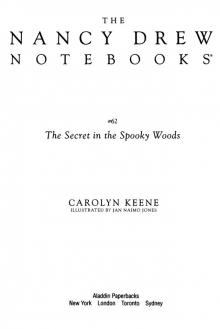 The Secret in the Spooky Woods (Nancy Drew Notebooks Book 62)
The Secret in the Spooky Woods (Nancy Drew Notebooks Book 62)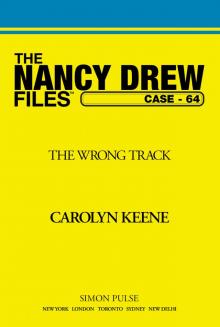 The Wrong Track
The Wrong Track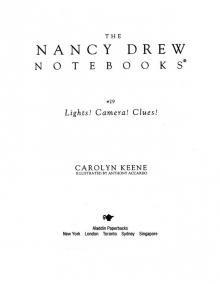 Lights! Camera! Clues!
Lights! Camera! Clues!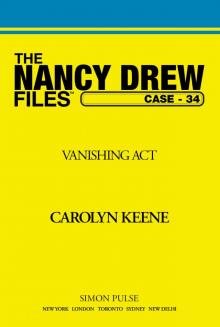 The Vanishing Act
The Vanishing Act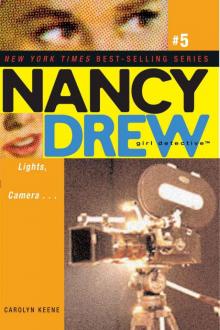 Lights, Camera . . .
Lights, Camera . . .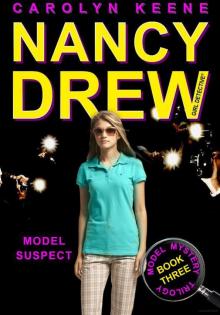 Model Suspect 3
Model Suspect 3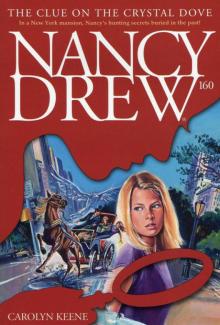 160 The Clue On The Crystal Dove
160 The Clue On The Crystal Dove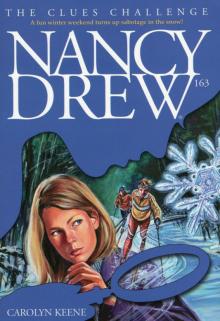 163 The Clues Challenge
163 The Clues Challenge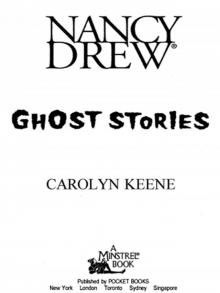 Ghost Stories (Nancy Drew)
Ghost Stories (Nancy Drew)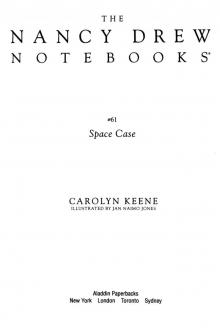 Space Case (Nancy Drew Notebooks Book 61)
Space Case (Nancy Drew Notebooks Book 61)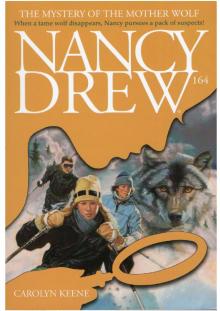 164 The Mystery Of The Mother Wolf
164 The Mystery Of The Mother Wolf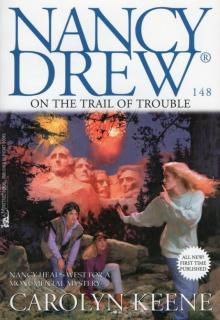 148 On The Trail Of Trouble
148 On The Trail Of Trouble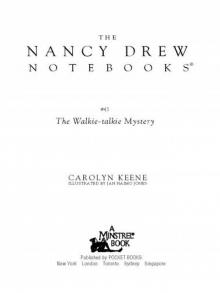 The Walkie-Talkie Mystery
The Walkie-Talkie Mystery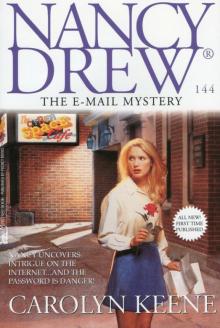 The E-Mail Mystery
The E-Mail Mystery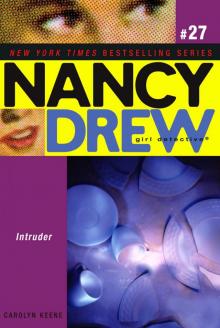 Intruder (Nancy Drew (All New) Girl Detective)
Intruder (Nancy Drew (All New) Girl Detective)![The Stolen Relic [Nancy Drew Girl Detective 007] Read online](http://i1.bookreadfree.com/i2/04/11/the_stolen_relic_nancy_drew_girl_detective_007_preview.jpg) The Stolen Relic [Nancy Drew Girl Detective 007]
The Stolen Relic [Nancy Drew Girl Detective 007]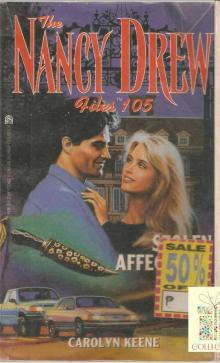 105 Stolen Affections
105 Stolen Affections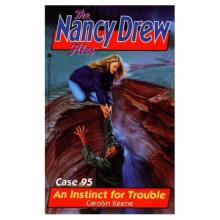 An Instict for Trouble
An Instict for Trouble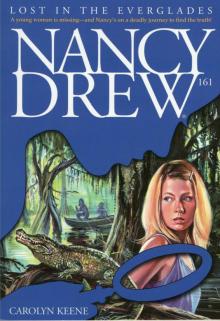 161 Lost In The Everglades
161 Lost In The Everglades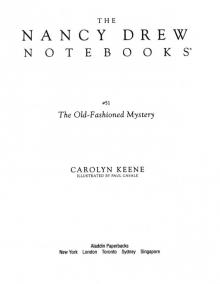 The Old-Fashioned Mystery
The Old-Fashioned Mystery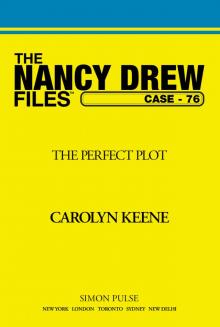 Perfect Plot
Perfect Plot